The End of Spring 2403
Part Two: A Letter from Antonio Mugello to my most noble Lord Lucca Vescucci of Verezzo
Forgive me, my lord, for the untidiness of my writing, but I am forced by circumstances to pen this missive both in haste and in conditions unconducive to legibility. For the first time in a long while I am not far from Verezzo, being merely a league south of Ridraffa, but the joy I should feel about my proximity to home is diminished by the news I send.
The brute tyrant, Razger Boulderguts, led his army from the beating he received south of Remas, travelling along the Via Diocleta, and occasionally through the rolling hills when the whim took him.
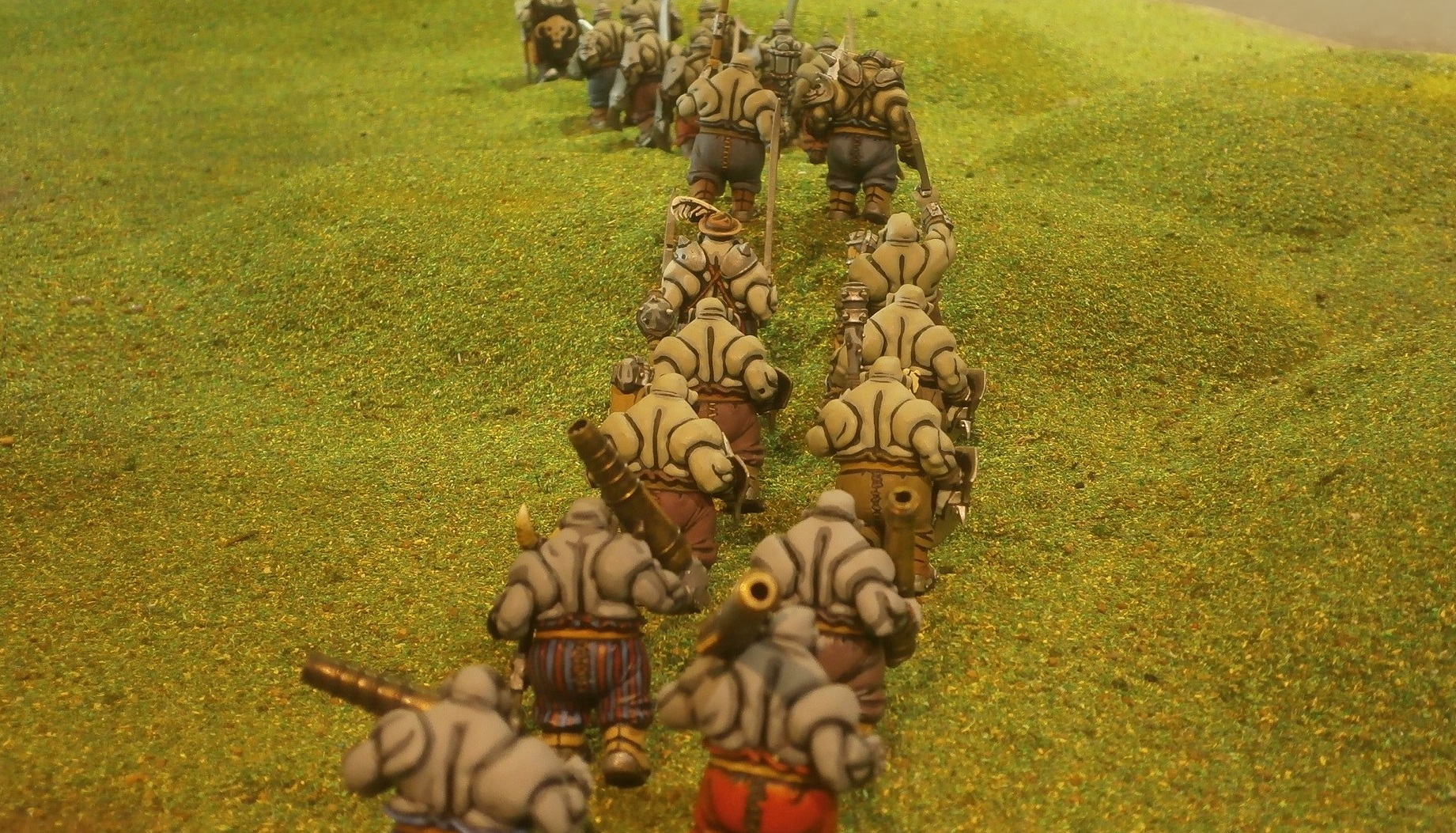
Neither the Remans nor the Pavonans sought to pursue him, for the former seemed happy enough that he had turned away from their realm, and the latter were in no fit state to attempt any further action in the field. Indeed, Duke Guidobaldo, finding his son and heir to be alive but horribly wounded …
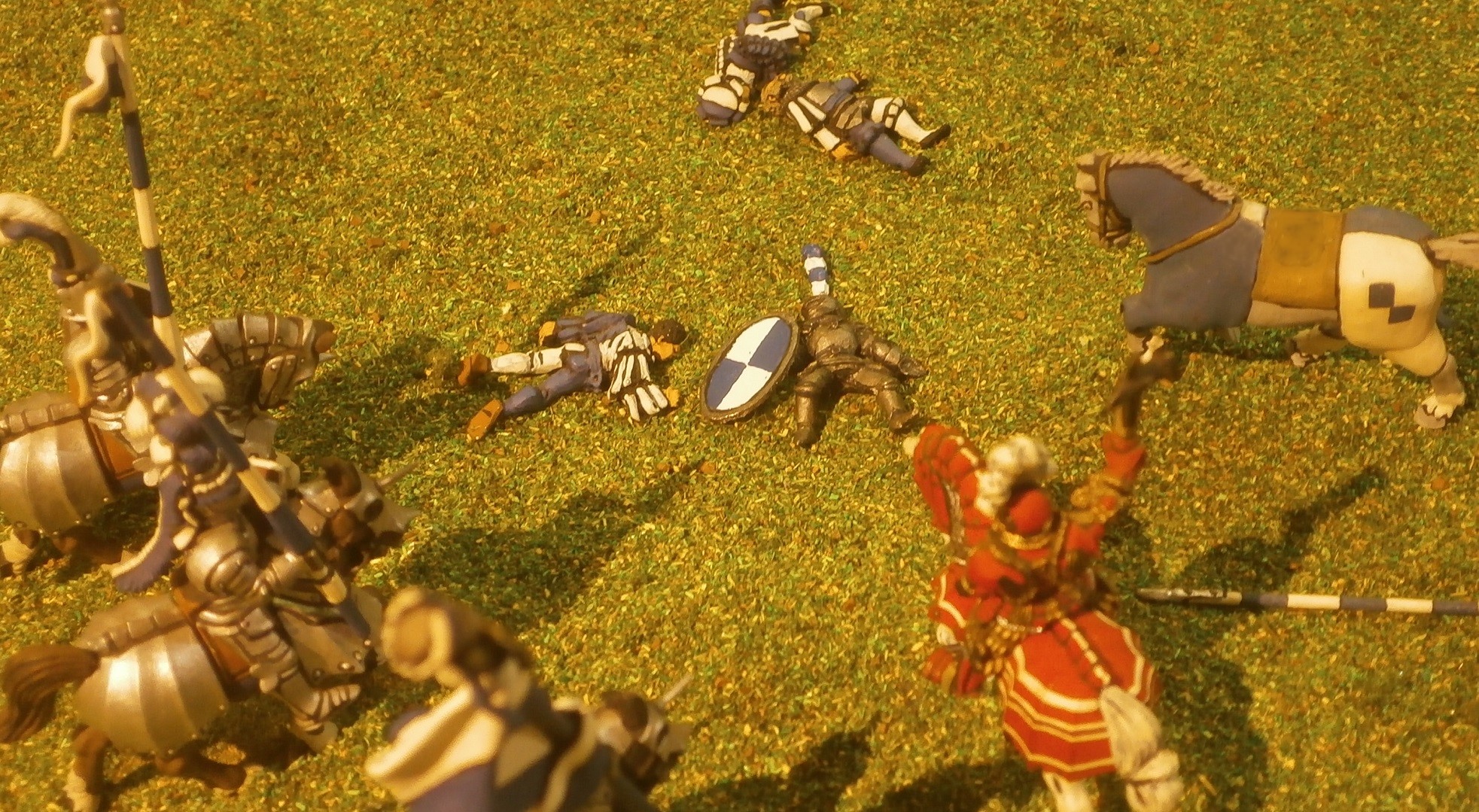
… did command that Silvano be carried with him to Remas, intending there to obtain the services of the best doctors the city has to offer.
Boulderguts still possesses the great train of loot he plundered from Astiano and Pavona, as well as much of his strength. Indeed, it might even be that his personal army has swollen in size, for whereas before the double army bore both his and Mangler’s standards at the fore, it is now reported that only Boulderguts’ are carried. Mangler’s remaining army, still a substantial force, must thus be marching under those banners, not their own.
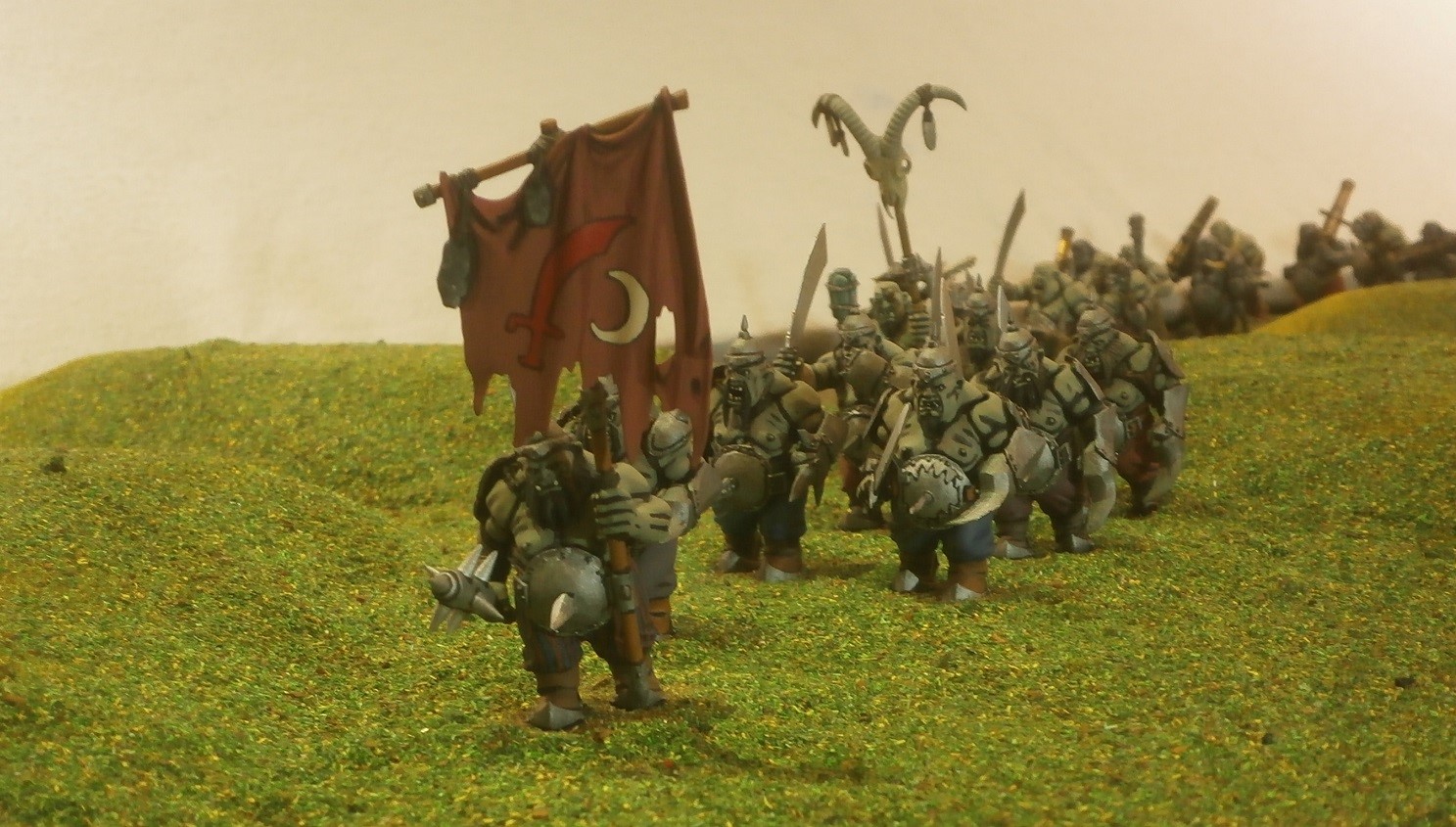
Several brutes’ corpses were discovered in the army’s wake, some showing signs of death from festering wounds received in the battle of the Via Diocleta, but others, being the mightier sort, bearing fresh wounds probably received in some internecine strife. Such evidences most likely indicate that Razger has successfully wrested complete command of the entire force for himself, dispatching all contenders or complainers.
Taking leave of the Reman and Pavonan army in Frascoti, I followed the brutes with several scouts, until I joined a party of Verezzan merchants seeking a safe route home. Upon learning that I was your servant, the chief amongst these merchants, your friend Alessandro Burlemacchi, offered whatever I needed to assist me in my duties, and so enabled me to ride close to the brute army in the company of his best guards, all the better to spy upon them.
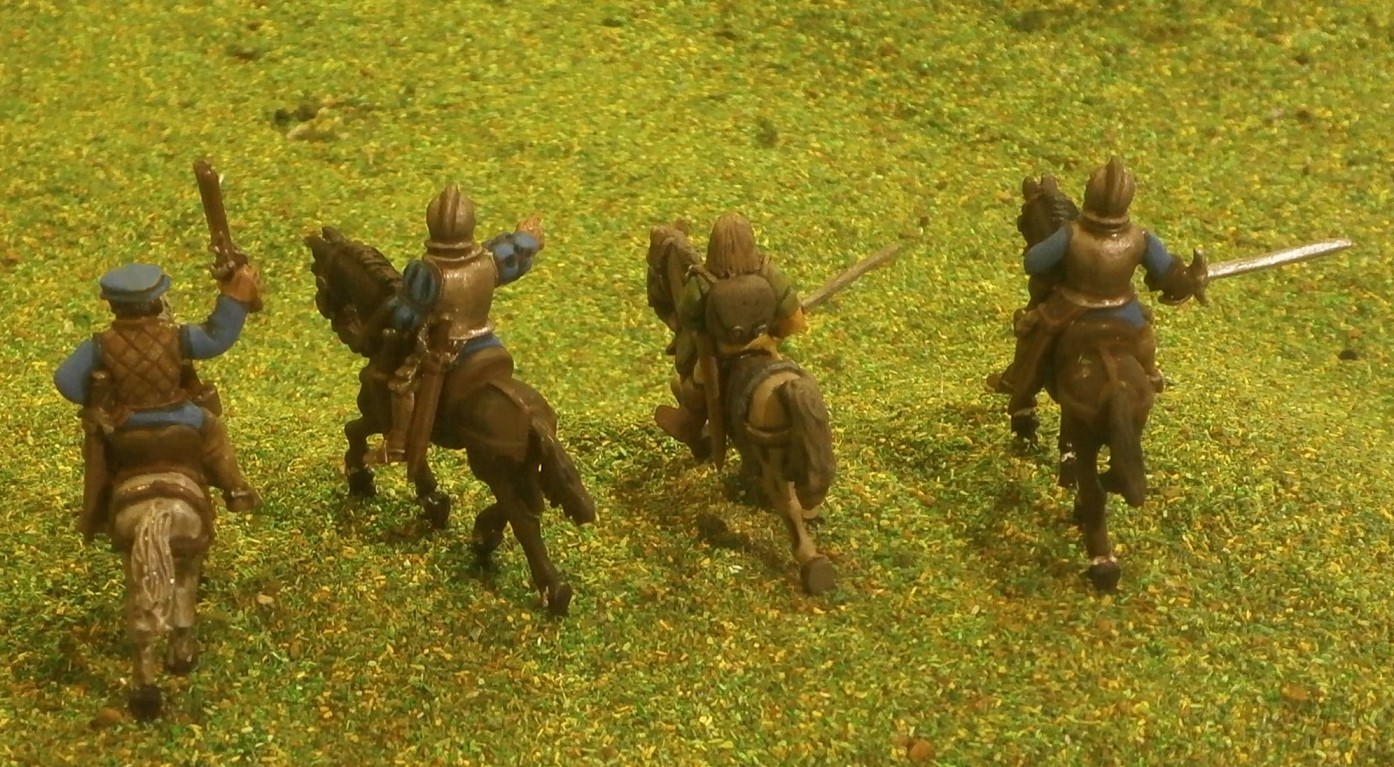
It soon became clear that Razger was not disheartened by his bloody brush with the dukes Guidobaldo and Scaringella, but instead sought to continue his spate of destruction and butchery. As his army approached Ridraffa, the bulging baggage train came to a halt whilst his grey-skinned warriors surged onwards in battle array.

The Ridraffans had made great efforts to fortify their city, circumvallating the entire periphery with earthworks and the ditches from which they were dug, defences which were both palisaded and studded with a forest of storm-poles.
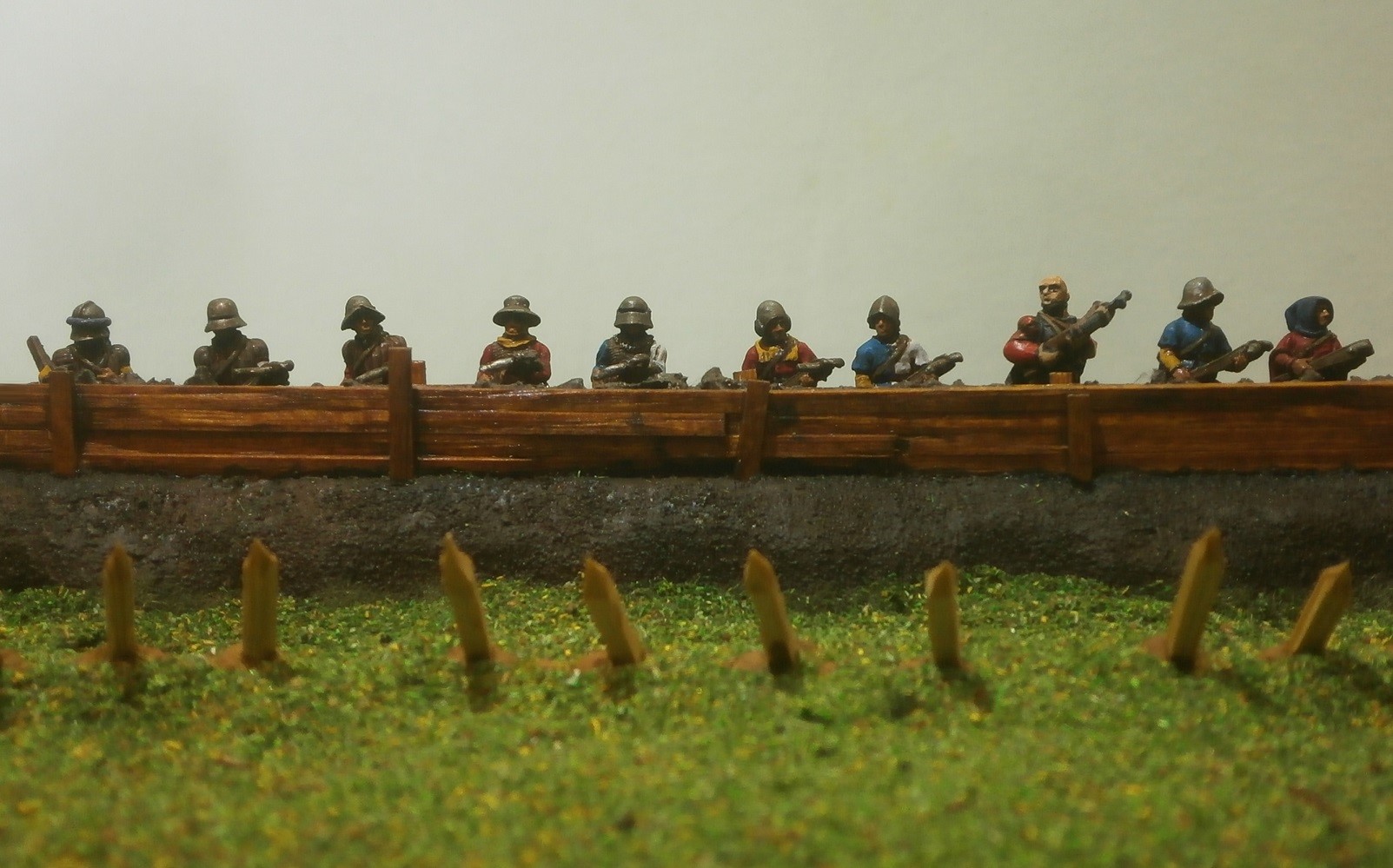
It seemed to me that the brutes would be sorely tried in the taking of the city, if even only a meagre garrison were available to man the works. But I did watch with mine own eyes as the hulking warriors marched on without once faltering.
I myself met with several of those who fled, including Master Poliziano, clerk to the city council and cousin to the gonfalonieri. It was from him I first learned the terrible truth concerning how the city had fallen so suddenly, an account which sadly has been verified by others I have met since.
The garrison was weak, certainly in comparison to Razger’s force, but their defensive works were strong, and they had a card to play which the Ridraffans believed could save them – none other than the Wizard Lord Salvatore. All in Tilea know that when the uomo ratto swarm threatened to swallow Ridraffa in 2381, Gervasio Strozzi conjured magics so powerful that nigh upon half the swarm burned, causing the rest to flee in fear, In this way he earned himself the new name of Salvatore.

Yet this time he was not to be so fortunate. Ancient as he was, his beard reputedly the longest and grayest born by any man south of the River Trantino, his bravery was undiminished. Indeed, perhaps he was too brave? For he was heard to say, “I need to get a little closer,” and before anyone could stop him, he strode beyond the works.
All those present fell silent, apart from one horn-blower who was so intent upon sounding his call to arms that he alone had failed to notice, despite being one of those closest to Salvatore.

Staff in hand, his large, crooked, green hat ensuring that every pair of ogre eyes could pick him out easily (especially when they sought out the blaring horn) he strode beyond even the storm poles. Perhaps he had become purblind in his old age? Or was so engrossed in his ethereal conjurations that he lost sight of this world and the many, mundane dangers it held in that moment? The soldiers stared in confusion …

… as he spoke the words of his incantation. Those who saw it told me that upon completion, and the bringing down of his staff, for a moment it was as if the world stood still. And yet, the sky remained calm – not one wisp of cloud appeared, not the tiniest flicker of lightning, nor even the faintest echo of distant thunder.
The brutes had halted, perhaps as surprised as the Ridraffans, and joined the momentary silence.
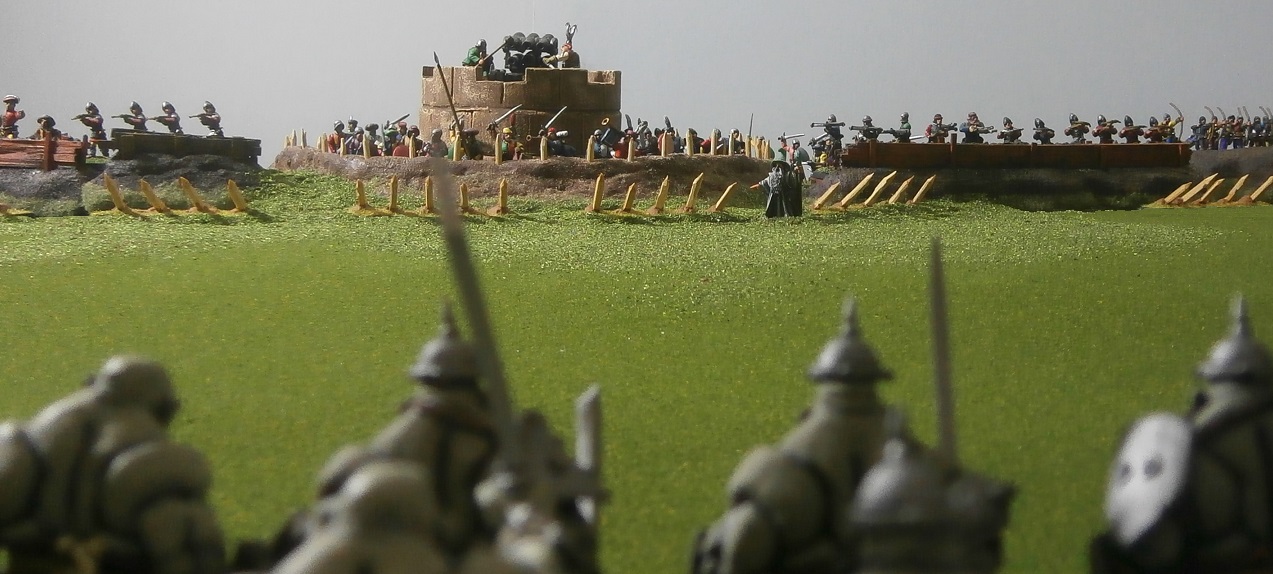
Then one was heard to laugh, and another to shout, and then many more gave vent to angry cries, and they loosed a rain of missiles upon the old wizard: a spear-sized quarrel, a hail of leadshot and a whole mess of mangled metal. Inevitably, in the midst of it all, as the grassy ground churned about him and the storm poles at his side shivered to pieces, he fell.
Then, as suddenly as the horn fell silent, it’s blower belatedly aware of what was happening, the brute army lurched forwards.
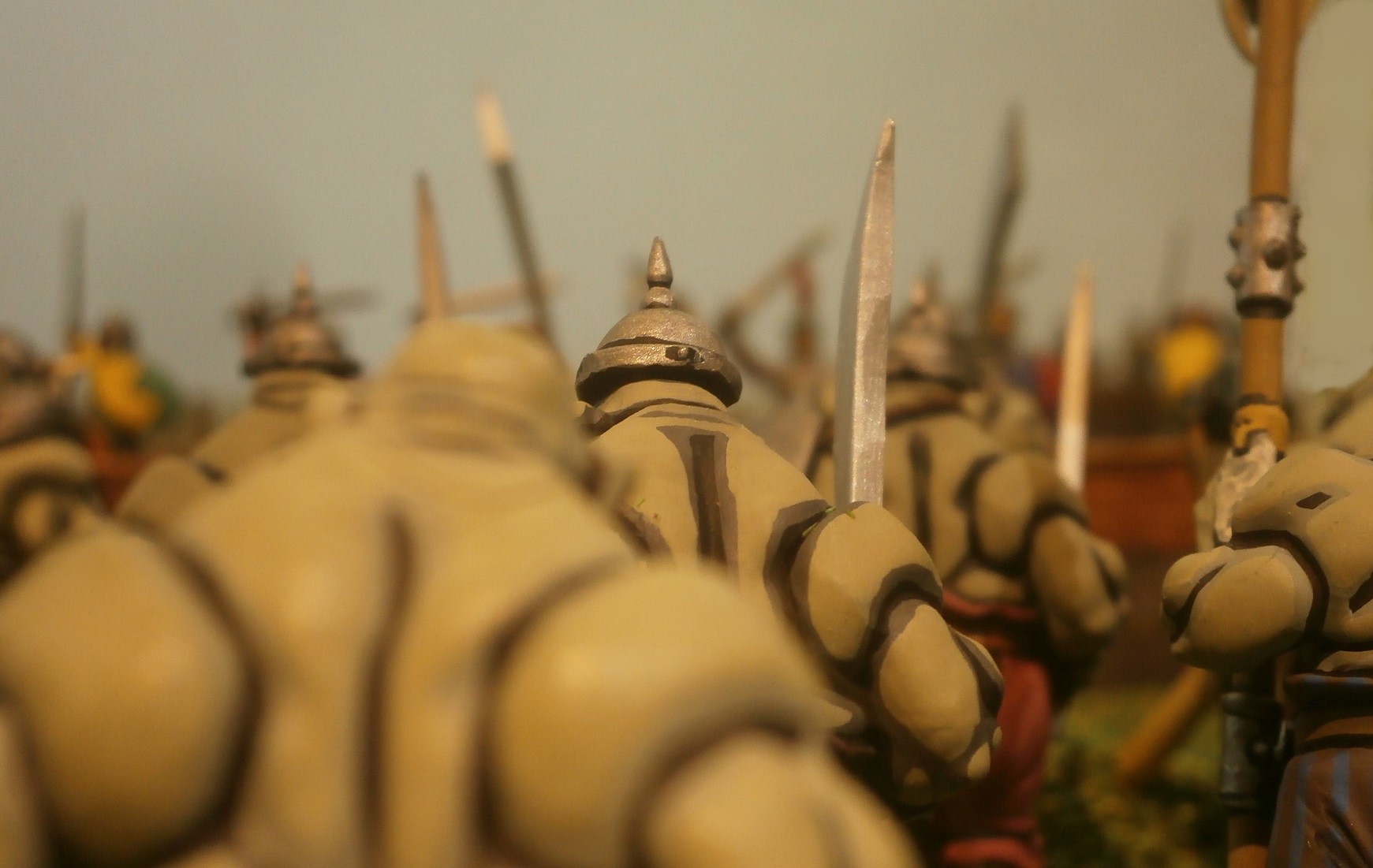
To their credit, I was told that not one Ridraffan militiaman fled, but instead they chose to fight, running from those parts of the works unthreatened by the foe to where the attack was to come.

They sent forth an hundred bolts, and drew every sword …
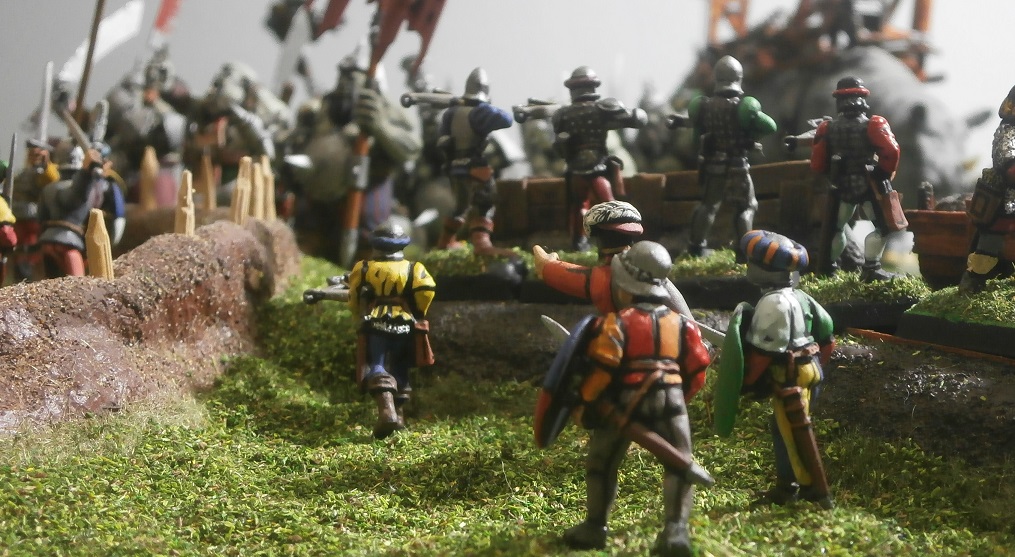
… but to no avail, for the foe burst through the storm-poles as if leaping nothing more than toothpicks, and mounted the works as if they were but molehills, and there was nothing the defenders could do to stop them.
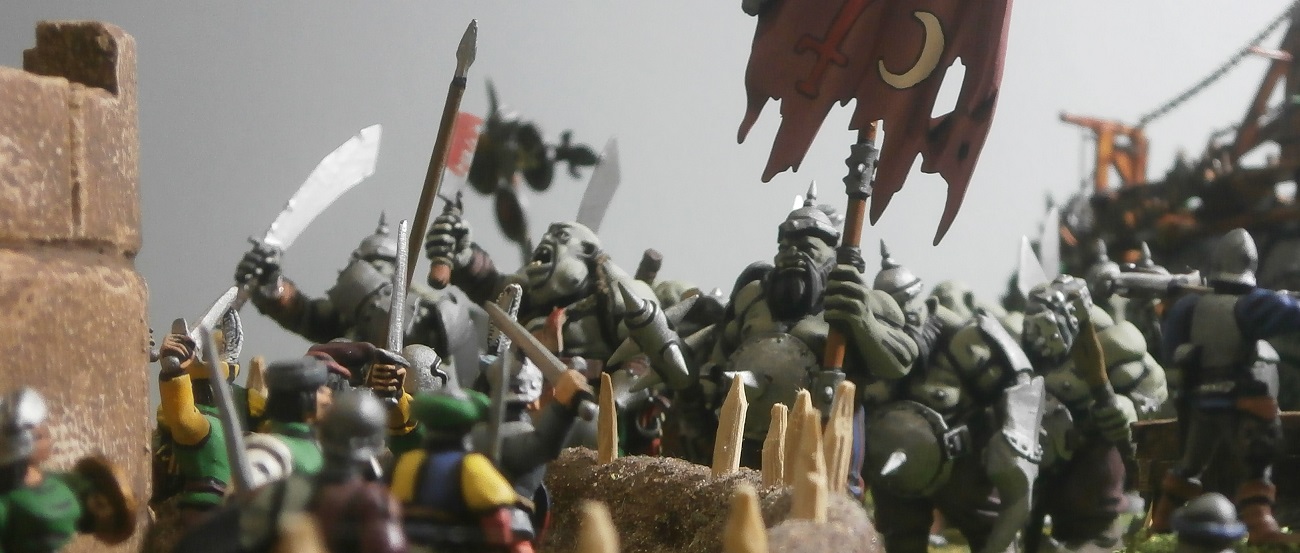
In this way Ridraffa fell, almost every fighting man brutally slain and crushed under the heavy, iron-shod feet.

And while the slaughter took place, the populace fled pell-mell from every gate, for the most part unburdened with possessions and goods. I believe so many escaped exactly because they left their wealth, even their livestock, behind, and in so doing the brutes were too distracted with the sharing of the spoils, to commence a pursuit.
Against the advice of the guards with me, and yet with their brave acceptance of my decision, I lingered in the vicinity of the city, intent upon discovering the ogres’ intentions, especially whither they would go. I was filled with dread at the prospect that they might choose to travel further south and so threaten your Lordship’s realm.
Razgers’ already huge baggage train swelled further as everything of value was dragged from Ridraffa. The ogres pressed every cart and wain, every carriage and coach, into their service, and still it was not enough (for many such conveyances had left the city in the days before their arrival). And so along with their greenskin servants they cobbled together carts of their own, taking wheels from barrows and gun-carriages, from the wrecked remains of abandoned wagons and the newly made stocks in the wheelwright’s workshops.
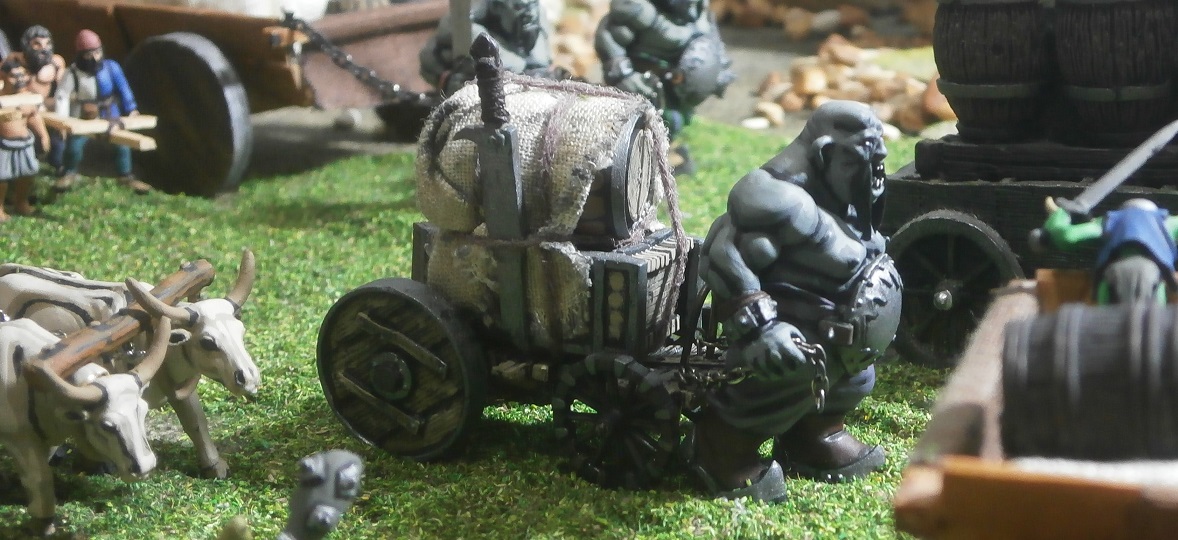
I myself saw them, through a perspective glass, as they left the city gates, their myriad means of transport, a hotch-potch of creaking and rattling contraptions, hauled by everything from livestock to slaves and even ogres.
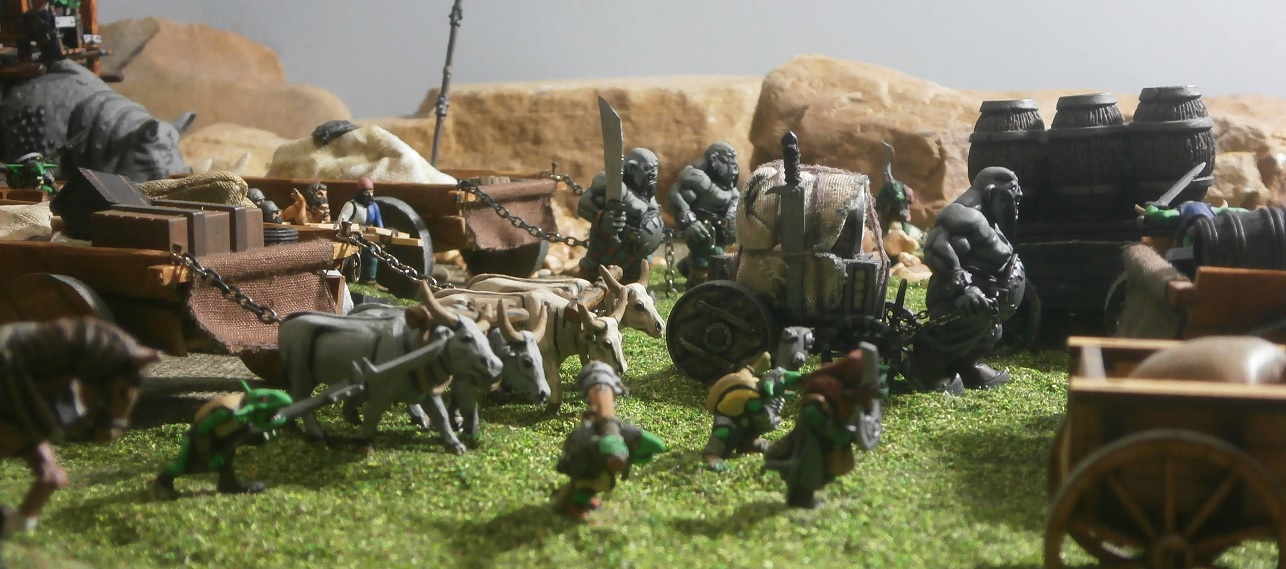
I watched as long as I could, until my guards pleaded with me to depart for mine own and their safety, so I can report only that the brutes were obviously heading for the bridge over the River Riatti. What Razger intends once they have crossed, whether to travel further south towards Spomanti and thus threaten your realm, or to turn north once more, perhaps finally sated by their vast haul of plunder, I know not. I could not cross the bridge for they left several brutes upon it, perhaps as a rear guard, perhaps because not all their force has yet to depart Ridraffa.
Thus it is that am dispatching this letter to you, and a further identical copy by a different messenger, to ensure its arrival, via two differing, roundabout routes, rather than carrying it myself. I intend to cross the bridge at the first opportunity, to continue following the brute army, and to learn as much as possible of their intentions.
I hope and pray that my next missive will bear good news. Your loyal and humble servant, Antonio Mugello.
…
Game Notes:
This story was derived from a battle and the events around it. I didn’t write a full report, however, as circumstances dictated it was to be a quick game (taking the time for lots of pictures and notes was impossible). Besides, it didn’t seem ‘interesting’ enough, in that we both knew who would surely win! A part of me was glad I didn’t take detailed notes because I made a shocking and stupid decision in the first turn which, without a doubt, cost me the game – or at the least to the chance to do any significant damage to the ogres.
Jamie is the campaign participant playing Razger Boulderguts, while I (being campaign GM) commanded the NPC force defending the small city of Ridraffa. I had modelled some new defences for the city, to expand those I had already made, and I used some newly painted generic militia figures as part of the defending force. When I realised 850 points was trying to take a nearly 3000 pt enemy, I thought playing a game would be a pointless exercise, but then I remembered that the players’ realms and major NPC realms were allowed to have a free ‘ruler lord’. So I decided that the Ridraffans could have a level 3 Wizard lord too. Combined with sturdy defences then … Game on!
Except, as described in Mugello’s letter above, in the first turn I stupidly decided to walk the wizard out of the defences so that he would be within range to attempt chain lightning. My logic (ha!) was to maximise the number of game-chances I had to make magic swing things in my favour.
Here is a shot of the moment from the actual game …

I had not, however, taken account of the scraplauncher, the pistol-toting Maneaters and the Hunter with giant crossbow. I should have done. All were now within range, of a lone character behind no cover, with no ability to use the ‘Look out sir’ rule.
Needless to say, it did not go well. Salvatore could not save himself (ironic). He died, and the ogres walked the rest of the game. The only real harm the Ridraffans managed to do was to destroy the last of the ogres’ lead belchers, to the point where the unit couldn’t recover. Considering, however, that the loot gained from razing such a small city could buy the lost Leadbelchers several times over, I doubt Jamie minded.
Still, it made writing the brief account above easy, and at least it wasn’t a run of the mill sort of battle, or story!
…
The End of Spring, IC2403
Part Three: Shooting at the Butts
(Terrene, part of the city state of Verezzo)
At Poliena, the largest settlement in Terrene, that part of the city state of Verezzo almost wholly inhabited by halflings, the afternoon was as pleasant as could be expected. Three regulars were enjoying the sun outside the Hairy Hog alehouse …
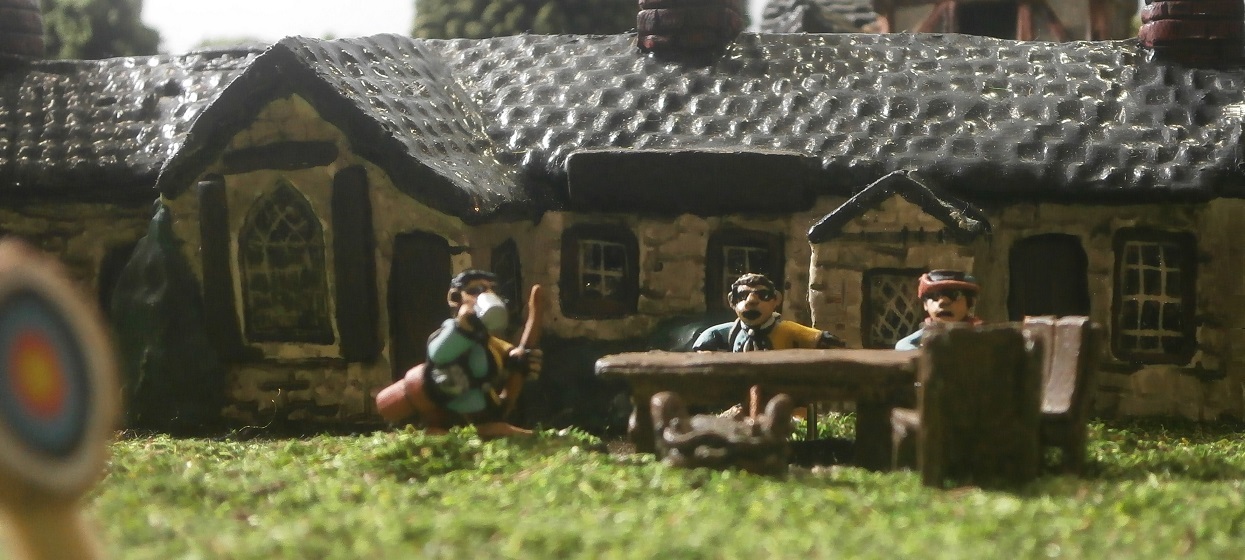
… supping of the best the landlord had to offer. In many ways, for them, this was no different to any other afternoon, except that they were dressed in blue and yellow livery, and had a very important visitor.
Pablo was drinking deep, so that ale ran down his chin.

“Best not over do it,” suggested Tino. “We have to put on a good show.”

Pablo, who heard him, continued to gulp down his ale, while Benneto, who was clearly not listening, stared absently at what was happening on the green.
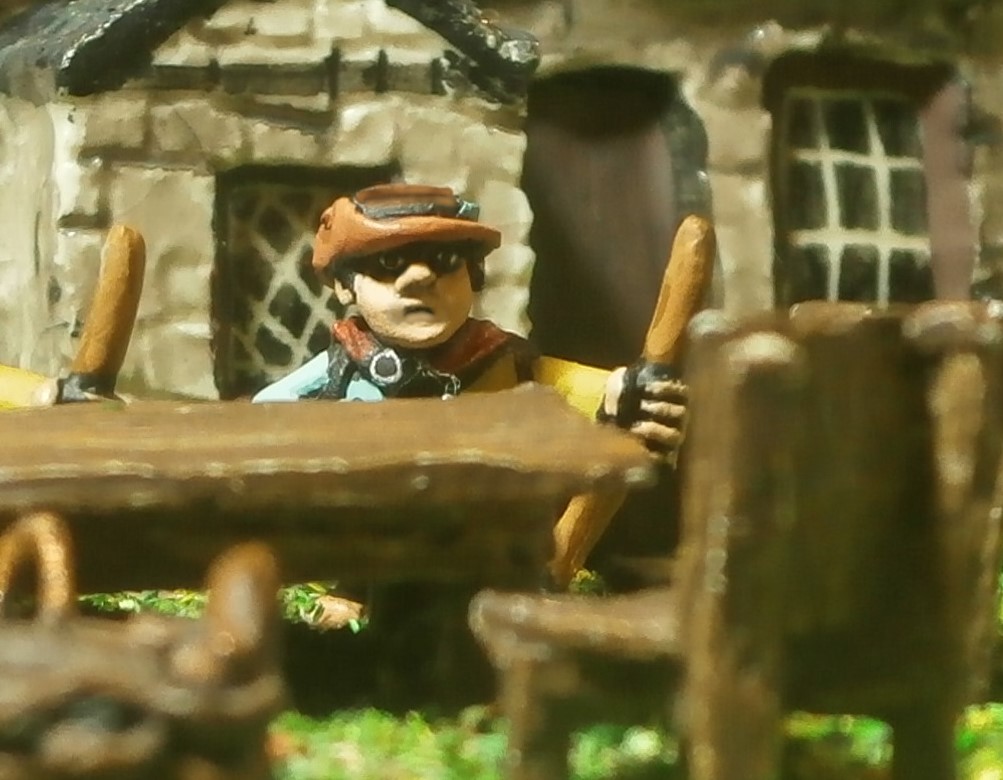
Tino watched with raised eyebrows until Pablo drained his tankard then brought it down to rest before his belly.
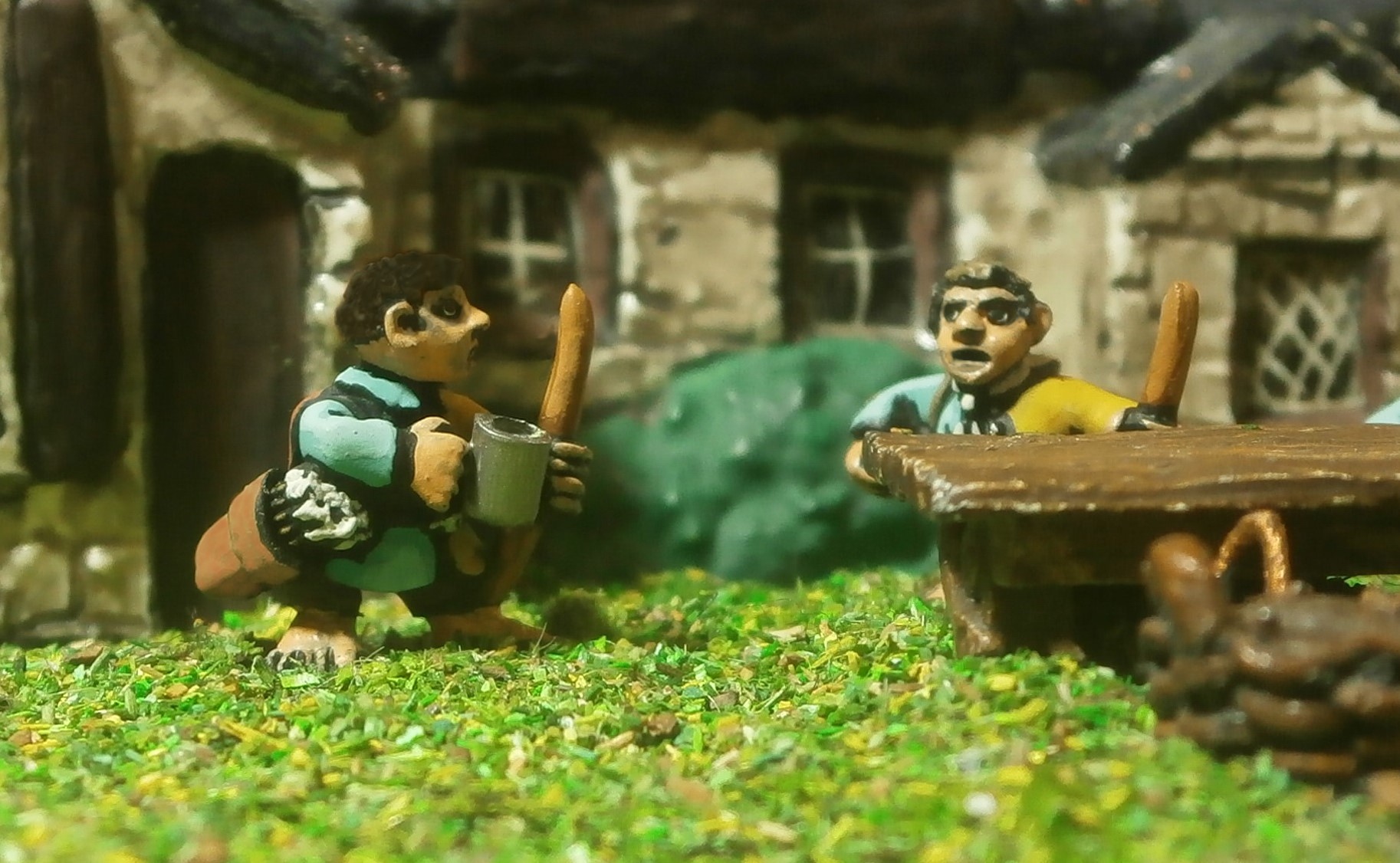
After wiping his chin with the back of his hand, Pablo hiccuped, then gave a silly smile. Tino’s brow furrowed, which made Pablo smile all the more, and he threw in a chuckle for good measure.
“I heard you,” Pablo said, before Tino could give vent to the inevitable complaint. “I just think my shooting’s better with a belly full. Steadies my aim, see?”
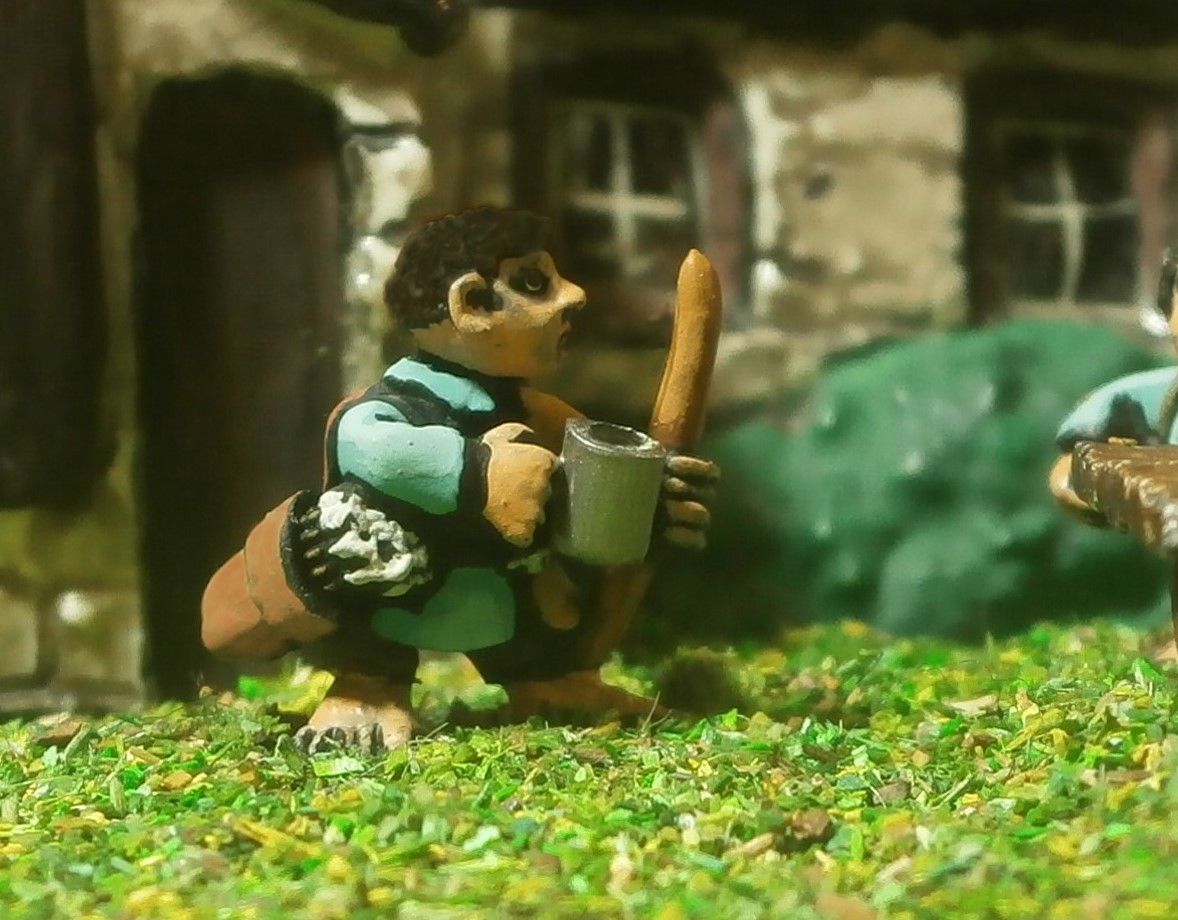
“Makes you care less about your aim, you mean,” said Tino. “You’re lucky Lord Lucca is twice your height otherwise he’d smell the ale on your breath.”
“But all soldiers drink before battle.”
“Ha! This ain’t battle. This is us showing our lord what we can do.”
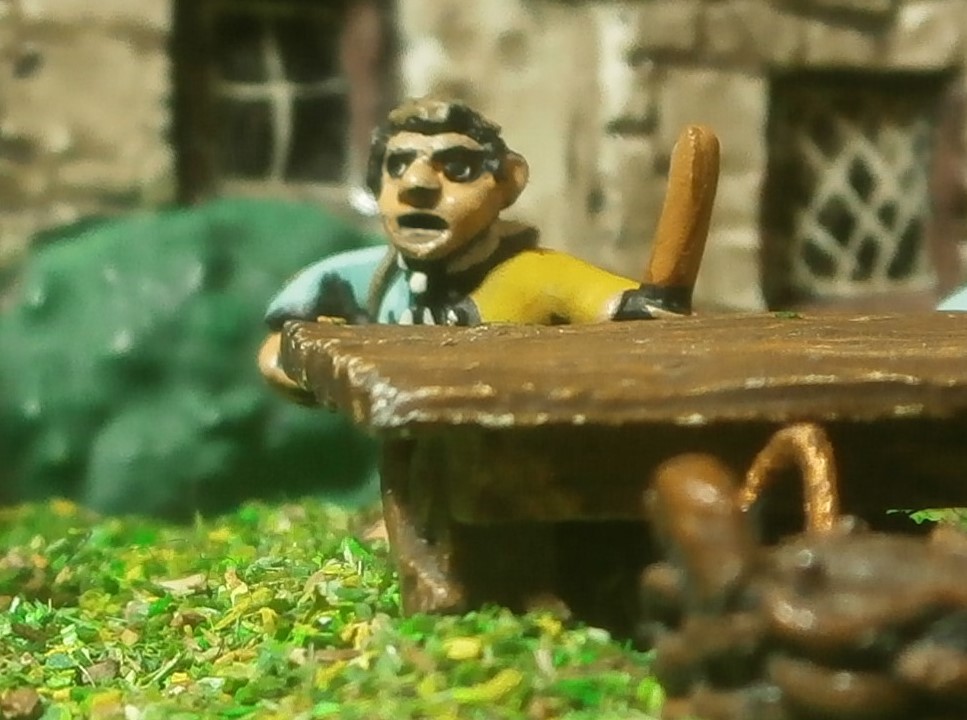
The silly smile reappeared on Pablo’s face. “All’s well and good then, ‘cos drinking’s what I do best,” he said.
The word ‘battle’ had jolted Benneto out of his dreamy daze. His brow furrowed.
“You think we really will have to fight?” he asked.

“Ridraffa’s fallen, so it’s likely we’re next,” explained Tino. “Boulderguts has ravaged his way through Tilea. Why would he suddenly choose to stop unless someone makes him do so?”
“But no-one has stopped him, neither Pavonans nor Remans, and not for want of trying.”
“That they have not,” agreed Tino, somberly. “But they must have hurt him.”
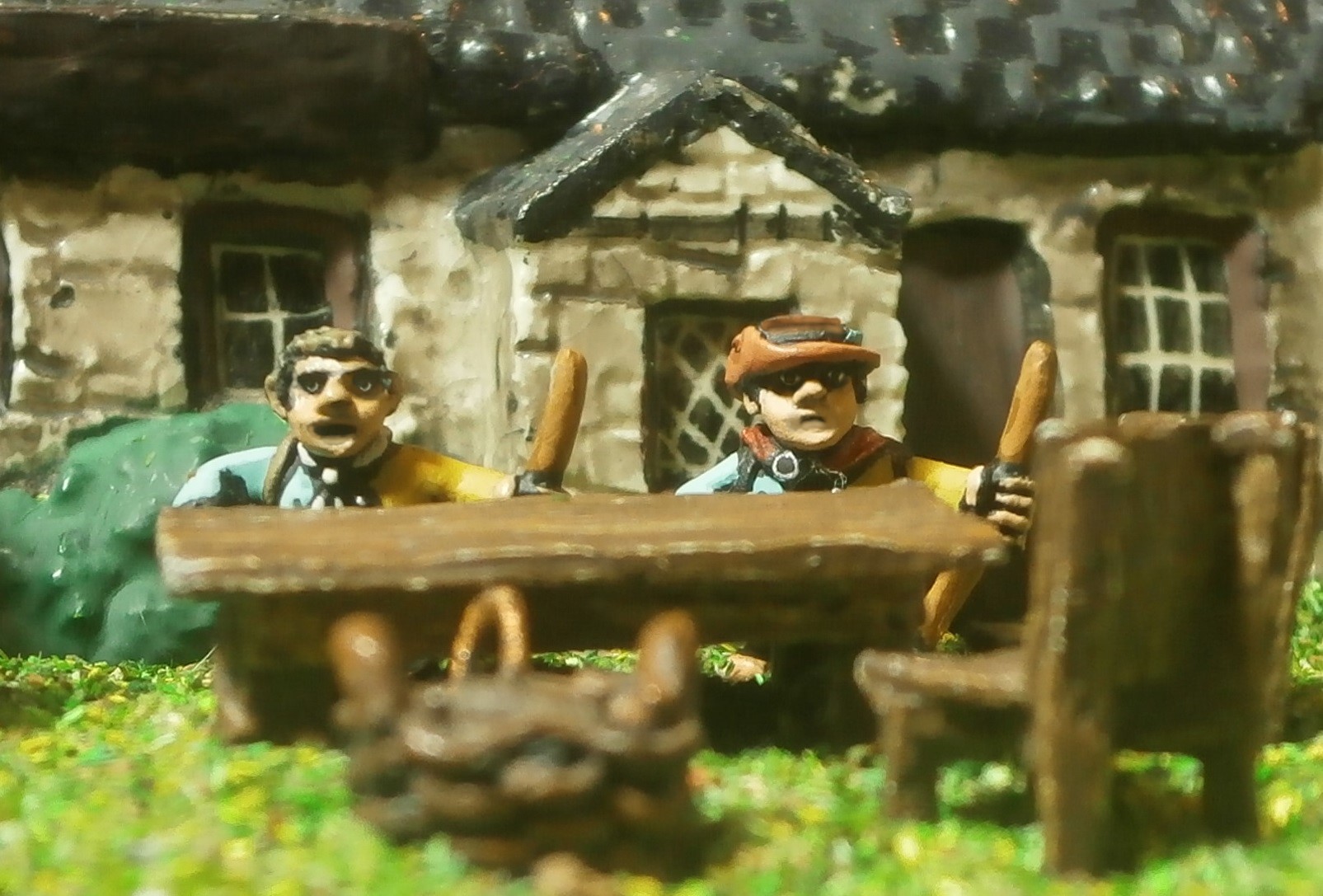
“How can you know that?” demanded Bennetto.
“I know because he didn’t try to take the city of Remas, where gold is piled high. And, they say he passed through Frascoti in such a hurry that his brutes took barely anything from it.”
“But they didn’t rush by Ridraffa, did they?” argued Benetto. “They bashed everyone’s heads in and took all they could. Which is a lot.”
“Ridraffa isn’t Verezzo,” said Tino. “We have an army. They only had some militia and a handful of mercenaries.”
“Oh aye, we have an army that includes us. Great!” said Benetto. He plucked an arrow from his quiver and laid it on the table. “Will our shafts even pierce the brutes’ flesh? Will they go deep enough for them to notice?”
“We’ll just have to see, won’t we? The only alternatives are to run away from our homes, or wait to be served up as meaty morsels on platters.”
The three of them fell silent for a moment, then Pablo piped up.
“Best have another ale then! While we can.”
…
Upon the green before them a company of archers were already letting loose at the butts. They too were liveried, apart from the hunter Roberto Cappuccio, known more commonly as the ‘Pettirosso’, who always favoured green despite his nickname.

Their weapons looked like longbows would in a man’s hand, yet they were no longer than what men consider ordinary bows. Every fellow present had practiced regularly since youth, honing his skill and strengthening the necessary muscles (moreso on one side of his body than the other). They could match the range and punch of a human bow, but they hit the mark more frequently, and they could generally shoot for longer, provided there was some nourishment to hand to keep their spirits up. And they were just as well practiced at ensuring there was always food to hand.
The village constable, Giusto Corumo, was also watching the practice, his two brothers by his side, his big baton resting on his shoulder. His youngest brother, Osvaldo ‘Grasso’, was eating a chicken leg, which was not surprise as he was nearly always eating.

It was Giusto’s responsibility to muster the militia, though not to lead them in war. He was the stepping stone that took the able-bodied from the world of peace to the field of battle; or more accurately, he was the short-tempered, foul-mouthed, club-bearing elder who roused them, rounded them up and presented them to the military officers, then washed his hands of them. For many a year he had rallied a rabble of lads for their bi-annual drills, with no shortage of cruel jests to shame them into activity. This morning, however, his tone had been just different enough that nearly every presumptive warrior realised this was something different, and not just because the muster was earlier in the season than usual. The constable had rushed like never before, he and his brothers rousing every eligible soldier from all the villages and hamlets in less than four hours, which was no mean feat for a fellow as stout as he, especially when garbed in an iron breastplate to enhance his military countenance.
The lads were right to be suspicious, for this was no mere holiday drill, this was the real thing – their Lord, Conte Lucca Vescucci of Verezzo, had summoned them to make ready for war.
Lord Lucca had arrived at noon, just as many of the gathered archers were beginning to hope that the muster was some sort of mistake. He had immediately asked that the several companies demonstrate what they could do. He had only a small company of guards with him, which included some of the halflings who attended upon him in his Verezzan palazzo. The conte was in no haste to witness their drill, but rather wanted to see their shooting skills first. So began an archery tournament lasting the afternoon, which the conte observed intently.
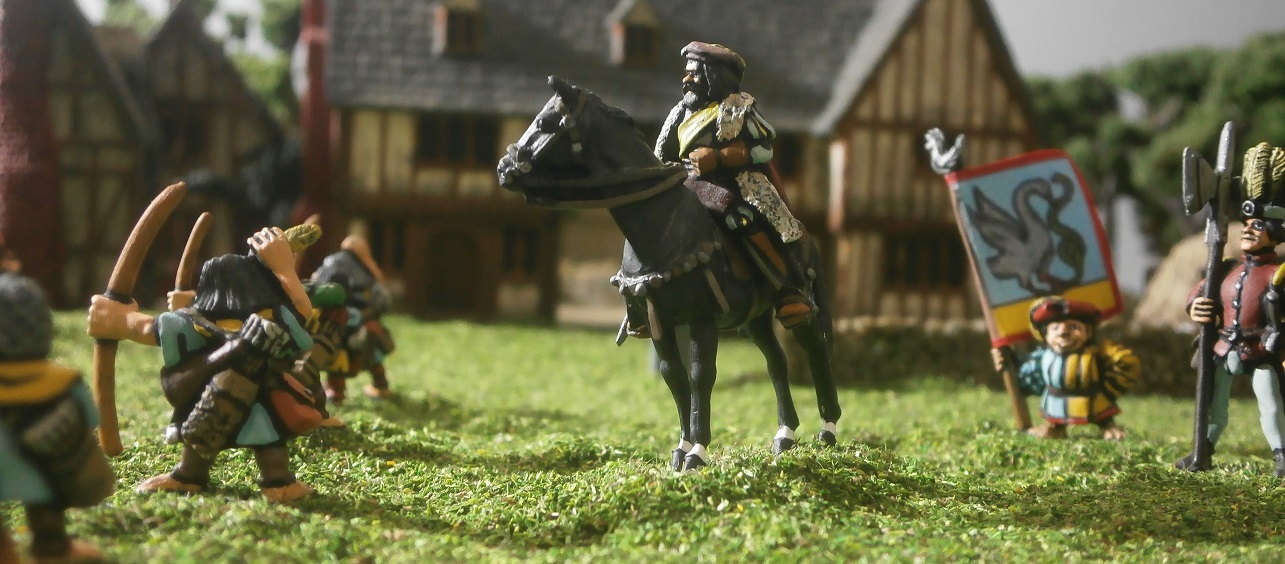
One rank at a time, the halflings came before him, planted their shafts in the ground, then began loosing them at the butts. This would go on until Lord Lucca cried: “Enough! Well done. Bring the next.” Then a gaggle of younglings would pluck arrows from the butts while the archers marched away and another rank took their place.
Lord Lucca was a natural philosopher and a meticulous organiser of his realm’s affairs, who took great care over matters of trade, finance and agriculture, studiously acquiring the knowledge he needed to keep his realm prosperous and safe. Here he showed the same attention to detail. As the afternoon lengthened, it became clear he intended to witness the skill of each and every archer, to see for himself whether (to a lad) they could be relied upon.
As time wore on he seemed to relax somewhat, for rank after rank showed impressive consistency in their aim, peppering the targets’ centres with ever more holes, while leaving the periphery virtually unblemished.
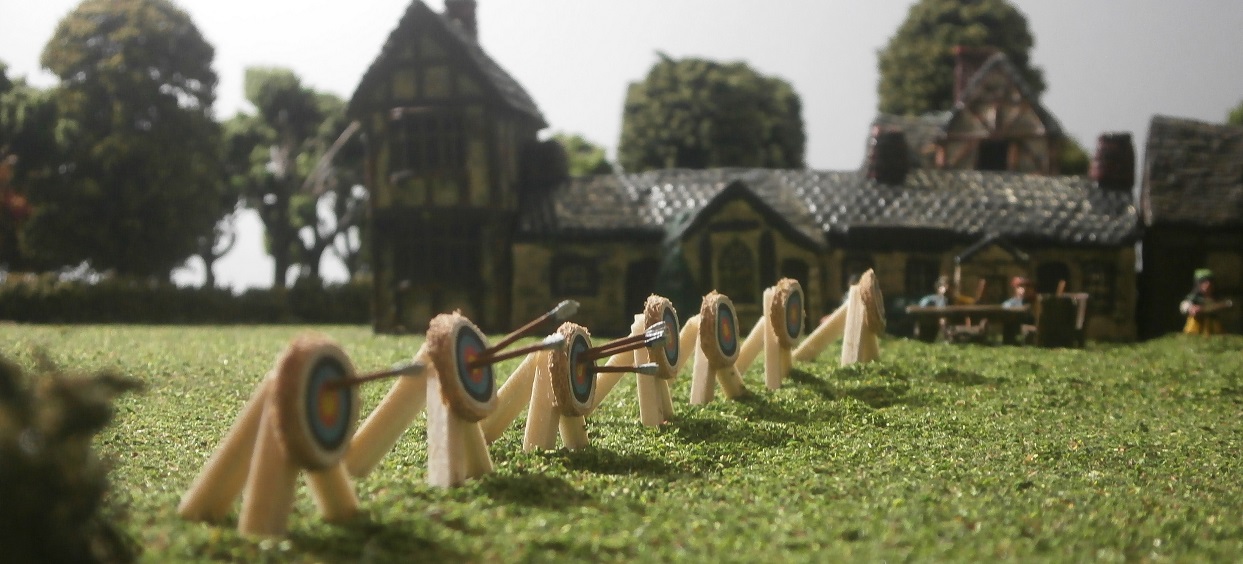
All was done in a leisurely, sedate manner, like a lazy game of stool-ball on a late summer’s afternoon, until almost everyone was thinking of the fine evening that must naturally follow this sport, with a pleasant pipe or two and a pot or three of ale.

But the slow pace was due to Lord Lucca’s usual thoroughness, rather than any lack of urgency, and as the last company was dismissed (looking forward to their first drink of the evening) he turned to the attending captains and ordered that the whole militia now assemble. He was now ready to inspect their brigade drill.
…
Within a quarter of an hour, the halfling militia had drawn themselves up into two bodies. Usually they would form up four ranks deep, but here they doubled their frontage to better fill the space available. Each company had its own colour, one called the red and the other the blue, as indicated by their flags’ edgings.

Lord Lucca was joined by Barone Iacopo Brunetti, the lord of Poliena. The barone would have cut quite a dash, cloaked and clad in armour upon his stout pony, if it were not for the conte’s contrasting bulk. Still, Iacopo’s pony bucked and reared as if keen for a fight, and he brandished his sword while delivering commands for the two company captains to repeat.
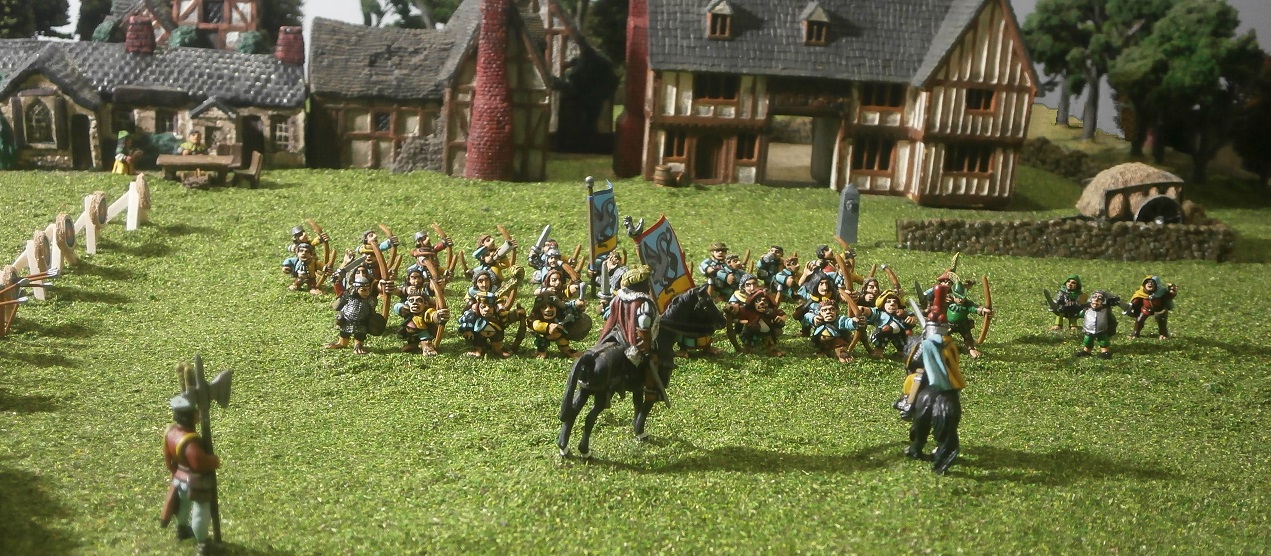
Once their manoeuvres were done, having wheeled, inclined and counter-marched to demonstrate the continued neatness of their dressings, they halted. The conte, apparently, at last, satisfied, now ordered them to stand, while some of his own little company of guards came up to stand behind him, and began a short speech:
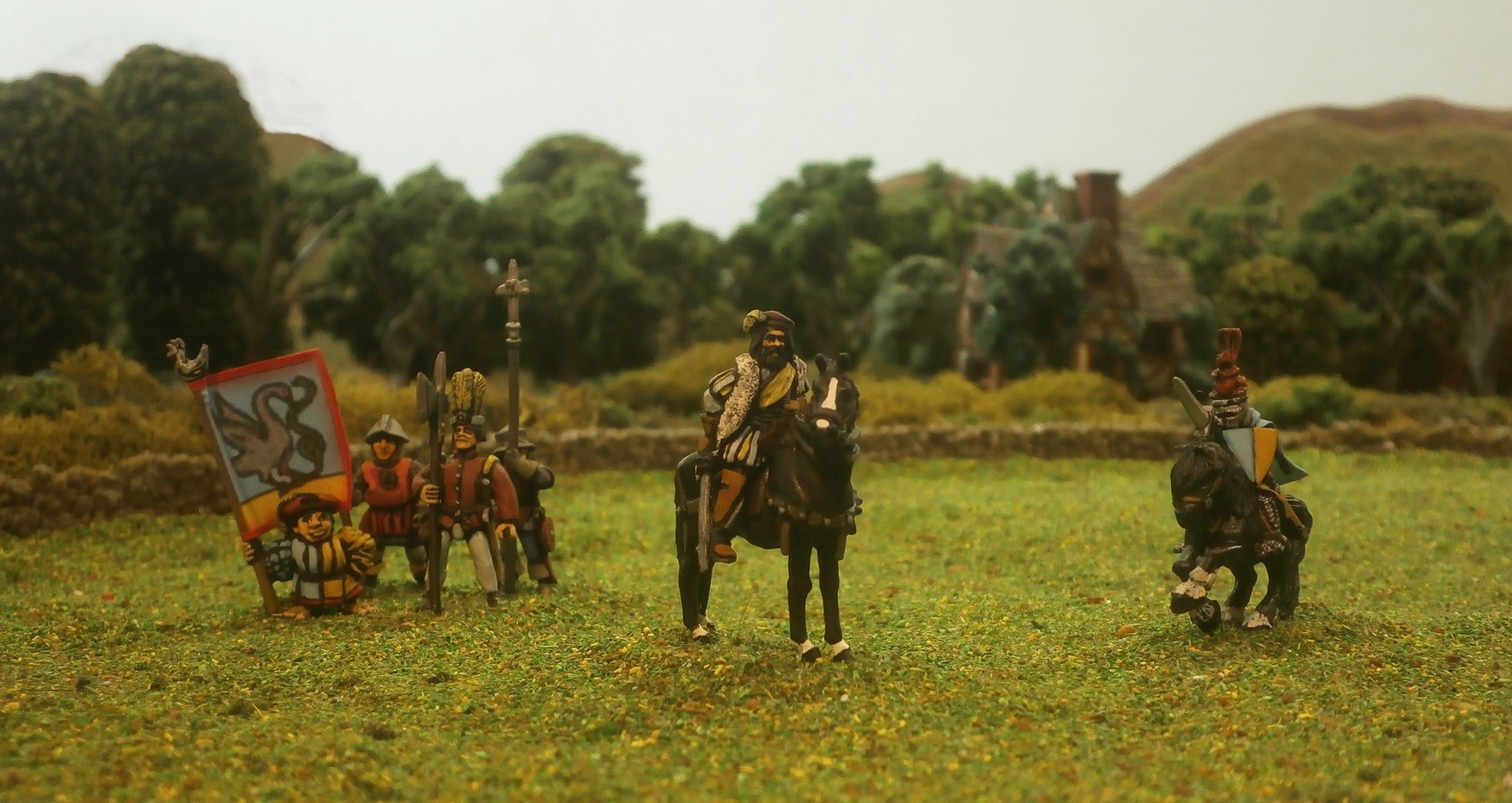
“You all know why you have been called forth this day. Indeed, all Tilea knows of the evils that beset our land – how so many other city states have suffered indignities at the least, and destruction at the worst. That will not happen to our dear Verezzo, for you and I will not allow it. Today you have proved yourself more than fit for any fight ahead. To a soldier, for that is what you are now, you shoot well, and as a body you are as expertly drilled as any mercenary, even any palazzo guard. Long practice has made you this way, and all that effort was done for this day. This e’en, first sharpen your arrowheads and fix your flights; hone your blades and look to all the trappings you need for war. Make these things as fit for battle as you yourselves have proven today to be. Whether brutes come, or the unliving foe, or both, we shall be ready for them, and they shall learn that what is ours cannot be taken from us, and that we will not allow those we love to be harmed. The men of Verezzo and Spomanti, and the halflings of Terrene, will stand strong together, each being the best I could hope for; each complementing the other to forge a fighting force of courage and skill.
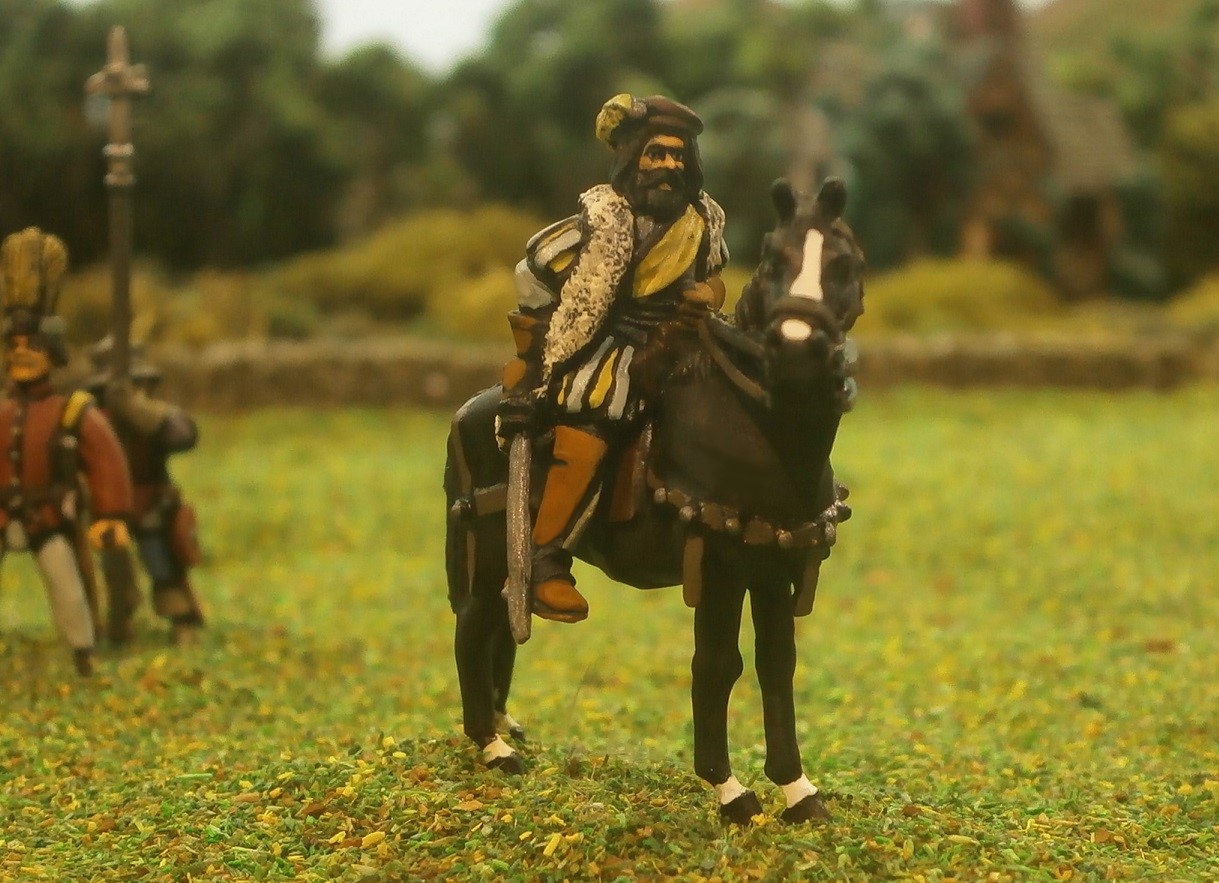
“Myrmidia has watched us today, and she will be pleased. Tonight, when every edge is as sharp as a razor, every bow waxed and all your armour oiled, say a quiet prayer to dedicate yourselves to her, and ask her to guide both you, your captains and myself in the days and weeks to come. Then, fill your flagons and drink a health in her honour!”
“Evviva!” came the cheer, again and again, as the two portabandiera flourished the colours aloft.

…
The End of Spring, IC2403
Part Four: The Machinery of Government
(The City of Remas)
After a momentary delay in an ante-chamber, whilst word of his visit was sent aloft, a servant had led Brother Marsilio up the stairs and let him into the studio, opening the door in silence.

Upon entering, Marsilio was pleased to discover a spacious, brightly lit chamber, infused with an aura of calm. It contained several well-stocked bookshelves. Papers and maps littered a large, central table and intriguing technical schemata adorned the walls. One might expect such a profusion of papers to create a cluttered effect, but here they advertised the operations of a creative mind, being the product of deep and orderly thought. After the tension of the streets, with every interaction – even the merest, momentary glance – either fearful or suspicious, it was a blessed relief to step into this room.
The maestro, hunched over the table whilst perusing a thick tome and several schemata, was so deep in contemplation that for a while he did not look up.

Marsilio used the opportunity to take a deep breath, soothing his excitable heart. A combination of nervousness, the disturbing world outside, and the climbing of the steep stairs, had worked together to put a strain upon his sanguine organ. The air tasted of old leather bindings and the mould harboured within, as well as the mite-ridden dust raised whenever a book is disturbed after a long slumber.

Marsilio found a sense of peace even in the smell of the room. He had not thought he would find such calm in any part of the city, such was his fear of being discovered at least as an emissary from the arch-lector, at worst as a prospective thief. His enjoyment lasted no longer than that breath, however, for upon remembering he must now reveal his true purpose, the nervousness returned.
The leaded glass of the windows was thick enough to dull the sound of the street below, so that when Marsilio’s slight movement drew forth a groaning creak from a wooden board, the noise was startling enough for the maestro to break from his studies.
“Oh, good brother. Forgive me my distraction, please,” he said, still perusing the papers on the table. “The written word and a well executed scheme entrances me as well as any enchantment, conjuring a tumbling torrent of ideas in which I am like to drown. Who knows how long I would have splashed helplessly in those scholarly waters had you not saved me?”

Maestro Angelo smiled, apparently enjoying his little joke, and turned to look at Marsilio. “Ah, now,” he declared, “I can see you a little better. My eyes grow lazy when reading so long.”

The maestro wore a tight-fitting hood and a surcoat of Reman livery, with a heavy silver chain about his shoulders. His neatly trimmed beard had almost succumbed entirely to grey, but it was his widely spaced eyes and flattened nose that drew people’s immediate notice. He was clutching his book in one hand, as if the weight were of no consequence.

“It is you who must forgive my intrusion, maestro. I am Brother Marsilio, and I am here upon a matter of some import.”
“Isn’t everyone, these days?” said Angelo with a smile. “Death hangs over us all. Not that it ever quite leaves a mortal man’s vicinity, but of late it has inched a good deal closer. Now we smell its foul breath each and every moment. Do you know, it has even found its way into my dreams?”
Marsilio was not surprised. He knew that Angelo had been present at the Battle of Ebino when the arch-lector Calictus had died, his army scattered, and all at the hands of monstrous legions of undead.
“If you please,” offered Marsilio, “I could say a prayer to help you sleep a little easier, for Morr rules over our nightly slumbers as well as our eternal repose.”
“Why not, brother? Of late, it seems the only prayers spoken are meant to disturb, not soothe.”
Maestro Angelo now gave Marsilio a piercing gaze, studying him intently.
“You were not sent by the Praepositus Generalis,” he said.
“No, maestro. I think all his fanatics are out upon the streets, to witness your new marvel. Indeed, I hope that is all of them, for if there are more then surely the entire citizenry has succumbed to the fury.”
Angelo smiled at this. He was not a handsome man, not least because his flat nose looked like that of an experienced pit fighter, being the result of a famous injury received in his youth during a somewhat impetuous experiment to test human flight by the use of artificial wings. Marsilio had noticed one of the large papers upon the wall showed just such an artifact.

“I have come from the arch-lector, his Holiness Bernado,” continued Marsilio, hesitantly. “I was sent … sent to ask you …”
Here he faltered, and Maestro Angelo’s smile grew broader.
“There is not much that is easy these days, brother, not even the asking of a question, eh? You need not rush. First, I would like to ask you a thing or two, if you will oblige.”
“Yes, maestro. Whatever you wish to know.”
“I heard Duke Scaringella died upon the Via Diocleta, but what of our army? None have returned to the city. Is it decimated?”
“No, it survived almost wholly intact. The arch-lector has command of it.”
“So easily? And he a clergyman?”
“He had precedent enough,” explained Marsilio. “His holiness led several parts of the army before, as well as fighting by their side at Viadaza and upon the Via Diocleta. He has both the soldiers’ respect and their willing obedience.”
“Their obedience? I heard our soldiers razed Frascoti, looting it as thoroughly as Razger’s Ogres would have done had they not rushed by so hurriedly.”
Marsilio had not realised the depth of the lies being told in the city. “That is not true, maestro. We have set up camp there, to defend it and the rest of Remas from any further aggression by the Razger’s brutes. The people have not been harmed. They’re thankful of our presence. Some of our soldiers are themselves Frascotans.”
“I do know our Pavonan allies are not with the army,” said Angelo. “Duke Guidobaldo brought his wounded son here, and his army too. Was there no room at Frascoti? Or perhaps there was some disagreement between him and the arch-lector?”
“None that I know of. The Pavonan army was very badly mauled, and their departure was not considered a great loss to the defence of Frascoti. Besides, in such times, why shouldn’t Duke Guidobaldo keep the last of his soldiers near?” Marsilio paused, then asked. “You mentioned the duke’s son. How fares the young Lord Silvano? His holiness bade me ask.”
“Oh, sadly he has lost an eye, but otherwise should recover well enough. I myself have visited him, advising his doctors as best I could,” said Angelo. “I am tasked with fashioning a glass eye so that he might appear as whole as before.”
It cheered Marsilio to know he could return with at least one happy thing to tell the arch-lector.
“One might ask,” said Angelo, fixing Marsilio in his gaze, “why the duke and the arch-lector would want the Pavonan army camped so close to the city. Their presence is generally considered unwelcome. What few Pavonan soldiers have snuck into the city, breaking their agreement, have been dealt with roughly, in accordance with Carradalio’s orders. It seems he does not trust them even to enter the city singly.”
Was the maestro trying to get military intelligence from him? thought Marsilio. If so, then perhaps his allegiance might indeed lie with the fanatics.
“I will not lie and claim to know that which I do not,” he said, “but I don’t believe the Pavonans’ proximity is a tactical ruse. The Duke certainly wanted the best doctors to attend Lord Silvano. And as a healthy, strong Remas makes a better friend for him in his time of dire need, then why would he do anything other than foster harmony between the divided factions of Remas? I very much doubt he intends to fan the flames of civil war.”
“He does not need to, that fire burns well enough without any help,” mused Angelo. “Yet Guidoabaldo is not apparently in any rush to return to his own ruined realm. Carradalio has even sent a father superior to minister to the duke’s army – one Rosello di Franchi, a Pavonan himself, although of a somewhat dubious past. By Rosello’s leave, Duke Guidobaldo’s soldiers can forage to feed themselves, provided they also attend the father superior’s services, and harken to his sermons. Perhaps Carradalio thinks thus to bend the Pavonans to his will rather than their own lord’s? Even to make dedicants of them?”

Marsilio frowned, for this all sounded very familiar. “He sent just such a man to our army at Frascoti …

… who preaches fulsome praise for our victory and our brave defence of Remas, ensuring all and sundry hear his words, from the greatest to the least. Of course, woven among his words are all the old Sagrannalian heresies.”
“Well, Carradalio has successfully wrested control of great and ancient Remas. Why stop there? His star is in the ascendant and the gods plainly favour him. Both armies have good reasons to hear his message: the Pavonans share his predilection to worship Morr Supreme, while many of our own soldiers have friends and family in the city.”
“Of that I am not too sure, maestro,” said Marsilio. He had heard the sermons himself, and seen the soldiers’ disdain.

“It seems to me that our soldiers do not enjoy being preached to about the war by those who have not fought in it. Do I take it from your words that you yourself favour Father Carradalio?” he asked the maestro.
A reluctant grin spread upon Angelo’s face. “Now there’s a real question. Favour is not required for respect. And in a time of war, men of action are needed. He is definitely that. He and his followers can stir a pot to the very dregs. They can turn a whole city upside down.”
“You have made a war engine for them, maestro,” said Marsilio.

“That I have,” admitted Angelo.
“I saw it myself on my way here, being pulled through crowded streets. I was surprised you were not with it, for I recall how you rode your steam engine before his holiness Calictus.”

Angelo shook his head. “I could not bear to accompany this engine; to be among these crowds. To speak plain, when I returned to the city I found what I found, and the fact that I did not like it mattered not …

… You seem Remas is still my home. I offered Carradalio a new engine to buy his favour, so that I might not suffer whatever ignominies he would otherwise demand of me. The work was as nothing compared to my steam engine, but he does not know that. In truth, this engine was already almost completed, having been laid aside when I commenced work upon the last. The glasses were ground, the mounting done. Almost all that was required was to assemble the parts. I had originally envisaged it as armament for the steam engine, but then Remas acquired a remarkable artillery piece, and when I saw what it could do, I chose instead to mount that.”

“Whatever its history,” asked Marsilio, “will this new engine not wreak destruction upon the foe?”
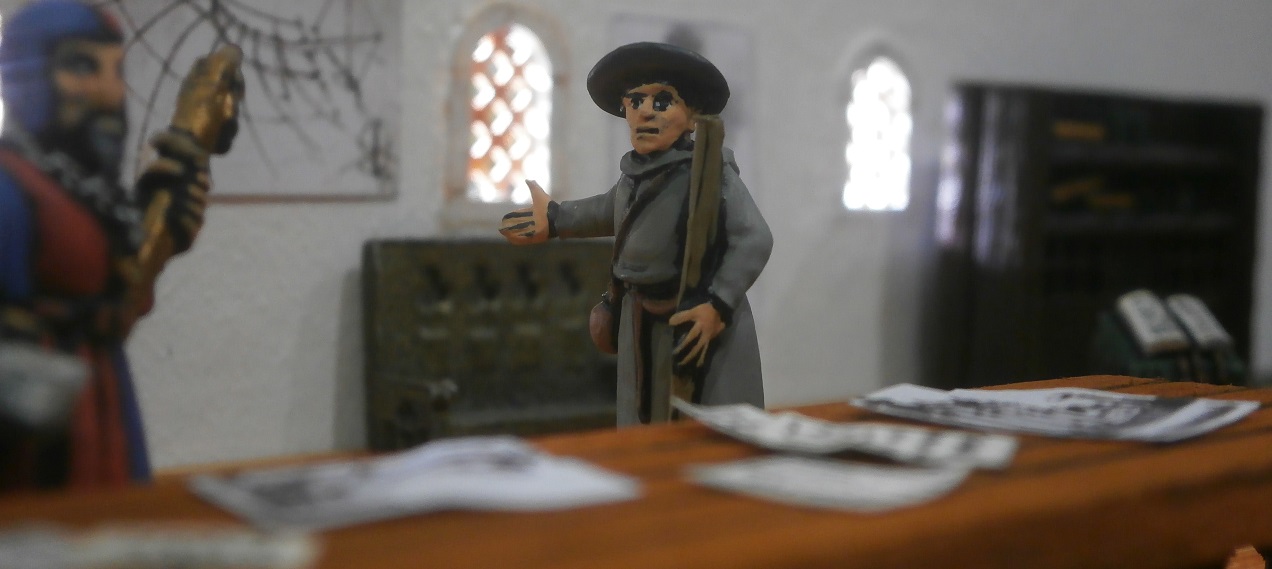
“Oh, I assure you, it is capable of truly awful effect. As to how reliable it is, I cannot say. The artillery piece depended upon the quality of the black powder and the expertise of the gunners. This machine relies on the vagaries of the winds of magic, and the mathematical cunning with which its glasses are deployed.”
“It looks impressive, maestro.”
The maestro narrowed his eyes, then asked, “Did you see who rode upon it?”
“Two men, both in clerical robes. One fellow, an old man, bald on top with tufts of hair sticking out from the side, was holding a skull aloft.”

“Oh yes, he came with them for the machine. I showed him as best I could how it should be used. I heard they tested it yesterday upon a blaspheming heretic – some drunken fool who questioned aloud whether Morr had abandoned us. They tied him to a stake at a hundred paces distance and in a few moments burned his body to ashes from the neck down. Only his head remained, and that fleshless.”

“Thus the skull?” suggested Marsilio.
“Aye, thus the skull,” said Angelo.
“How does it work?
“By an ingenious alignment of dioptrical glasses and prismatical crystals through which both natural and aetheric light are conjoined and congelated, refracted, multiplied and projected. The central glass is mounted upon a helical axle, allowing subtle adjustments of the interspatial lengths, so that the glasses can be arranged perfectly to concentrate and maximise the emitted heat. Or, to put it more bluntly” – here the smile returned, but in a pained form – “it burns people. Let us hope it burns the undead just as well.”
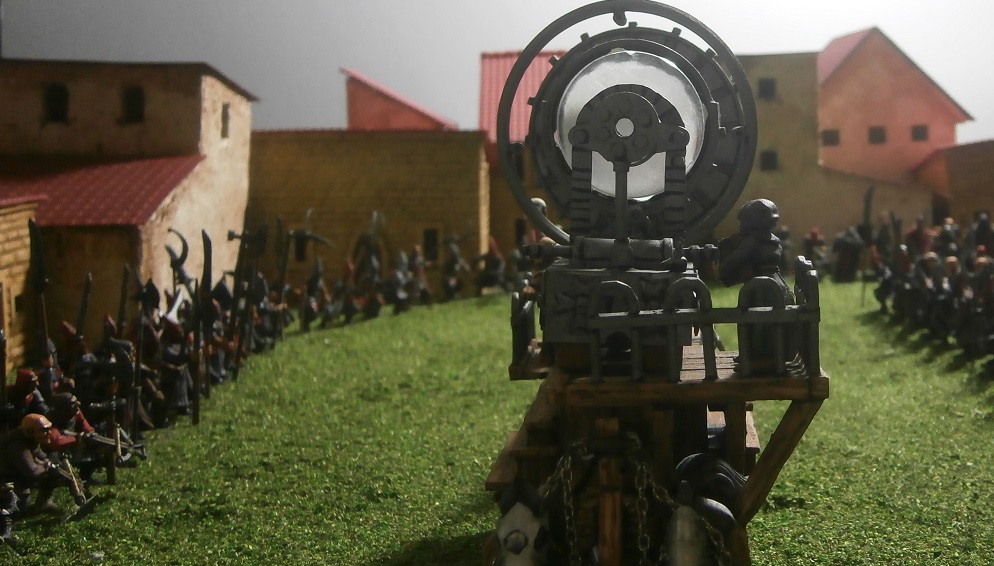
“Unlike my previous creation, this is no steam engine, for it requires a team of draught animals to pull it, with all their inherent weaknesses. In truth, the work was done in great haste, which seemed to please Father Carradalio and his strange companions more than care or craftsmanship would.”
“They have found good, strong horses, maestro, and armoured them well.”
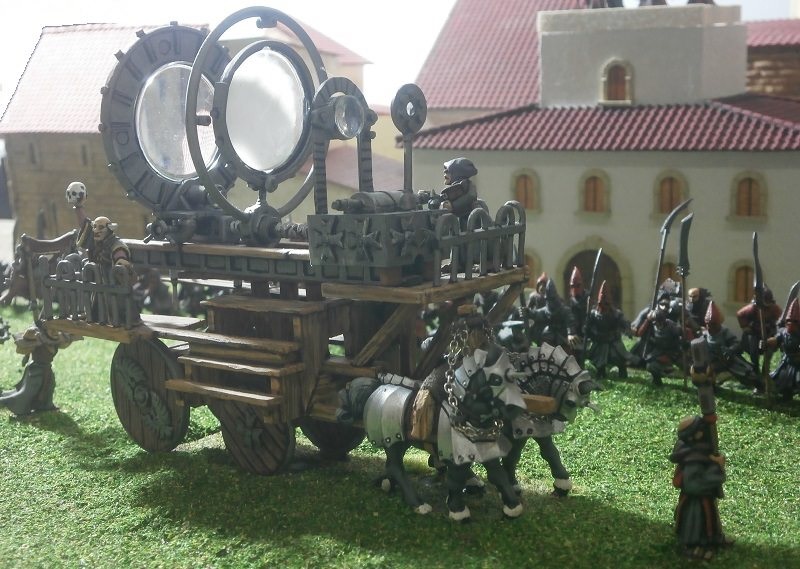
“Well they might,” said Angelo, the bitterness plain in his voice. “For they killed many of those left in the city who would have had the skill to ride them.”
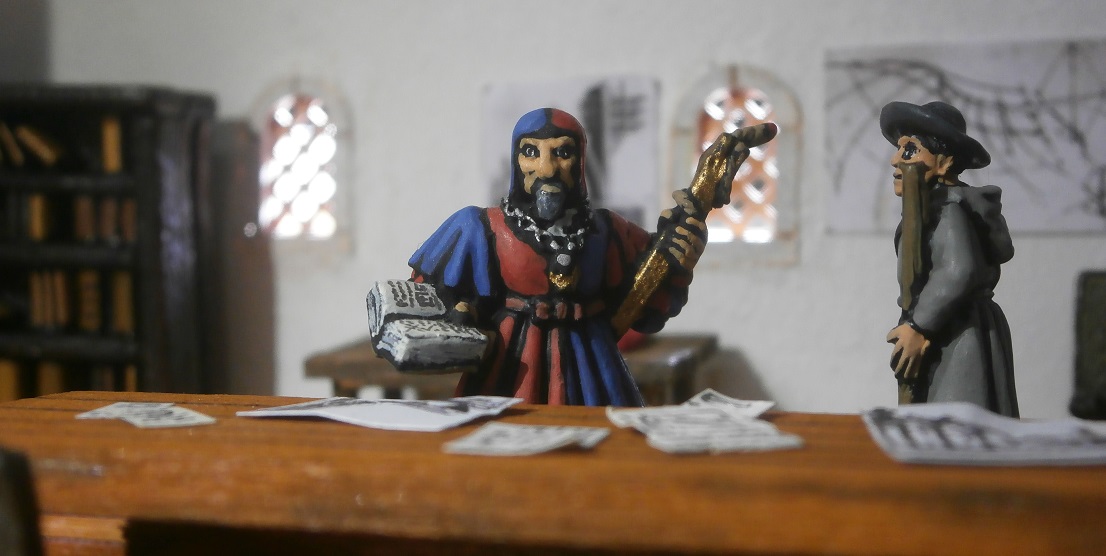
Marsilio could see the maestro’s anguish and thought it best to speak an appropriate prayer.
“Requiem aeternam dona eis, Domine: et lux perpetua luceat eis,” he intoned, quietly.
“Amen,” replied Angelo. “I think you know these dedicants exactly for what they are. I confess, I was afraid to be there today. I thought only to spend some time here, in contemplation, hoping their present satisfaction would mean I was left undisturbed. Yet, my part in all this weighs on me. Tell me, what else did you see?”
“They chanted as they accompanied the machine, carrying a holy relic before it …
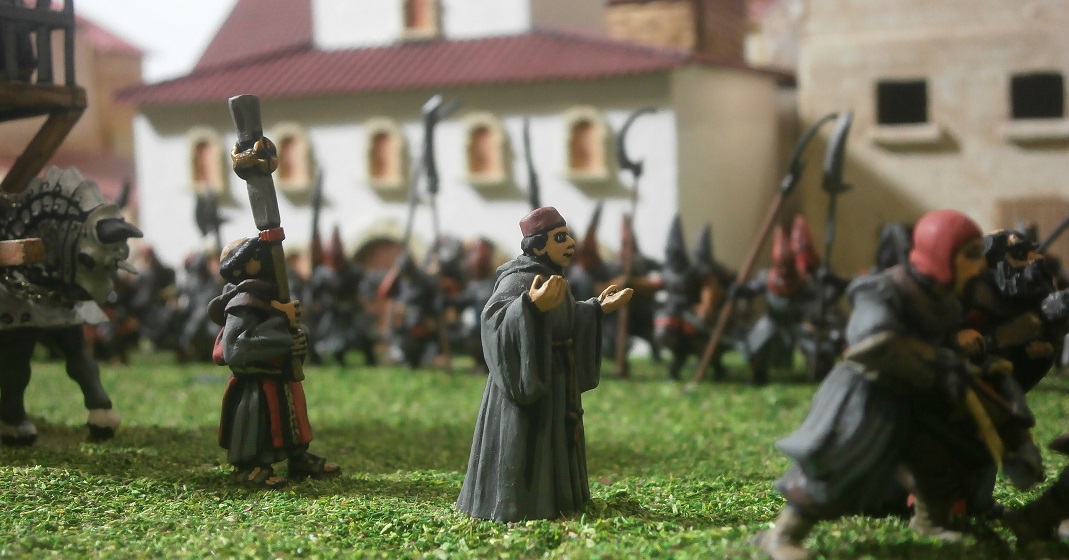
… and a ragged banner behind, attached somewhat painfully to the back of a crazed dedicant.

I saw it pass down the Via del Marcutto, the entire street lined with dedicants.
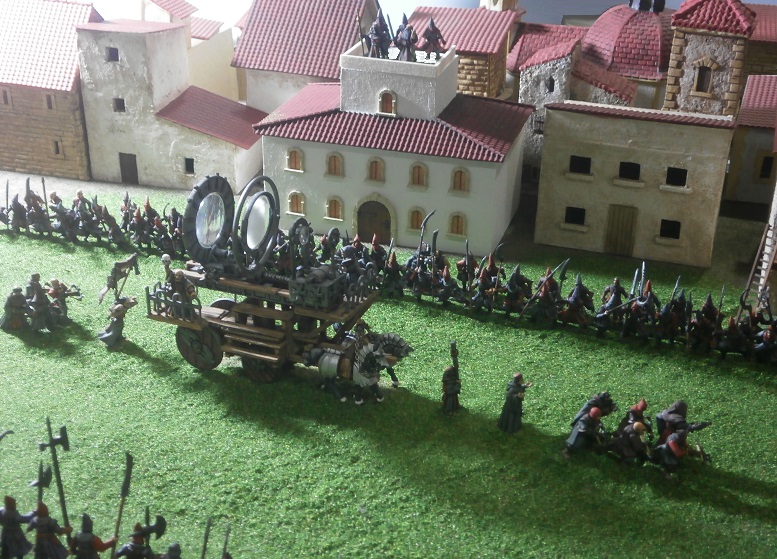
Father Carradalio himself watched it, standing upon the roof of the Cappella dei Santo Corvo.
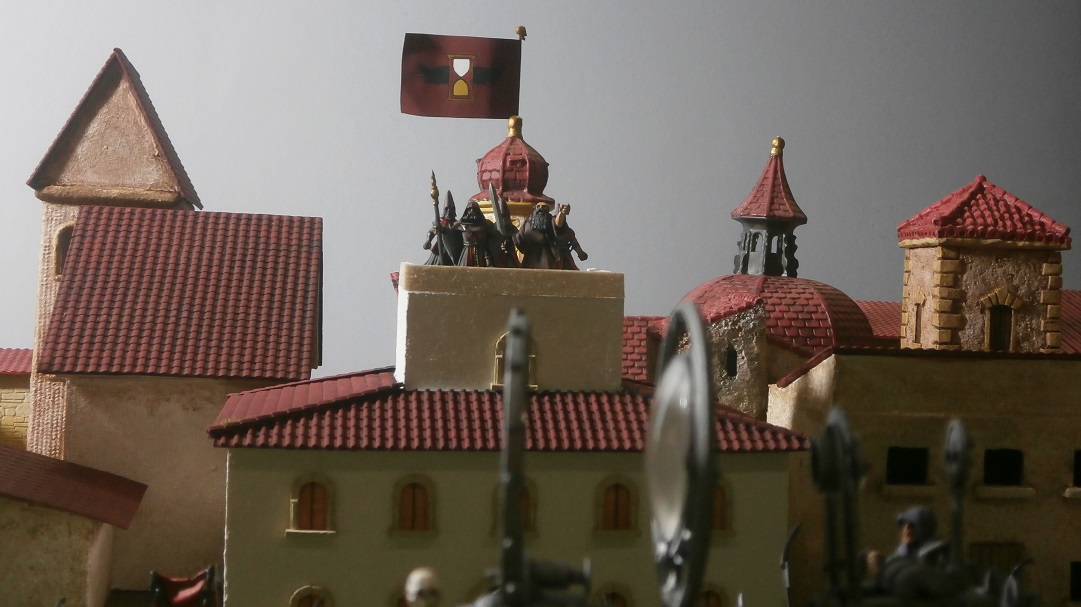
His Admonitor was beside him. His hooded guards behind.”
“That is all?” asked Angelo. “They hauled it through the streets. Nothing more?”
Marsilio could not fathom what concerned the maestro. “Just that.”
“Good. Would that I could ensure it was only ever used upon Remas’s enemies.”
Now Marsilio understood. The Maestro felt guilt about gifting such an engine of war to such a faction.
A smile, tinged with regret, returned to Angelo’s face. “Brother, what exactly have you come to ask?”
“The arch-lector wants you to leave the city with me. He believes your place is with the true army of Remas, the true church of Morr, and not with an unsanctioned, schismatical and rebellious fraternity of thugs. Remas and Tilea stand upon the brink of destruction, and the fate of every living soul is in the balance. Carradalio and his fanatics are a symptom of these terrible times. They are not the cure.”
“And yet,” interrupted Angelo, “they possess a faith strong enough to make them fearless in a fight, and would to die to a man facing any monstrous foe. I myself witnessed their kind in battle at Ebino. Our horse fought bravely, but were finally overwhelmed and fled. Knights, Arabyans, even elves, all galloped pell-mell from the field. Not the flagellants, though – they strode boldly forth to plunge deep into the enemy. Not a one turned to run. And this was done when the battle was surely lost. They feared neither death nor defeat.”
“Does such martydom win wars?” asked Marsilio. “Their flagellatory frenzies mean that even in victory they suffer terrible losses. And when they look to replenish their ranks, they will discover the realm they themselves ravaged has very little left to offer. I do not doubt they could win a battle. But the war?”
“You have just seen their host swarming on the streets, certainly sufficient in numbers to field an army,” countered Angelo. “Everyone knows they are capable of terrible and bloody cruelties. Whatever horrors they face, and whatever horrible deeds they themselves must commit, they will not falter.”
“But do they have the military discipline and cunning to gain victory in a war? Do they even remember Myrmidia’s name? I grant you, their numbers have swollen. Yet to achieve this they have wreaked havoc, divided Remas, slaughtered the best citizens, and destroyed much in the way of industry and husbandry. And all this they did while the ogres burned Stiani.”
“Well, no one can doubt their fervour. They’re willing to do anything for the love of Morr. Father Carradalio seems filled with divine inspiration.”

“As is the arch-lector,” countered Marsilio. “Perhaps Carradalio even hears the same words when holy Morr whispers in his dreams? But there is a great difference between the praepositus generalis and the arch-lector. Both have accepted Morr’s command to act, immediately and decisively. In this they are the same. But what his holiness has done in response to that call is not at all similar. As Carradalio fermented civil upset, his holiness led armies against foul foes. As the Disciplinati stirred Sagrannalian schisms, the church’s true clergy inspired soldiers to face almost certain death fighting monsters. For every riot Carradalio’s followers instigated, for every massacre they inflicted, the Reman army fought vampires, brutes and monsters. Carradalio watched the streets of Remas and Palomtrina run with the blood of innocents, while his holiness rode sword in hand at Pontremola, at Viadaza and upon the Via Diocleta. The Disciplinati di Morr have inflicted their frenzied fury upon the weak, while the army of Remas stood firm and faithful, even unto death, against the true foe. You yourself were at Viadaza and Ebino.”
Angelo was not smiling now. He stared into space, at a sight his memory had conjured for him. “Father Carradalio fears what is coming. I know what is coming,” he said.
“As does his holiness. Carradalio, in his own way, thinks to prepare Remas for the fight ahead. But the real army, his holiness and yourself are already in the fight, and have been for a long time. Remas must be made strong if it is to survive, by fostering unity, not division. Soldiers, militia, priests and brothers must serve together, under one command, otherwise disorder and disharmony will lead to destruction.”
“And how would that unity be achieved? Is the army to fight the Disciplinati? That is simply further disorder. And yet more destruction.”
“Carradalio holds Remas in his grip. If Carradalio took the city in the hope of saving it, then there is still hope. If, however, he intends tyrannical rule, then Remas’ ruin is almost certain. His holiness cannot accept Carradalio’s secular authority, no matter how complete – not unless the Overlord Matuzzi personally, and whilst under no form of duress whatsoever, asks him to do so.”
“That is unlikely,” said Angelo. “I was allowed to tend the overlord’s injuries after they took him hostage. However old and frail he might be, he retains sufficient will to hate Carradalio for his actions.”
“No matter,” said Marsilio. “Even without the overlord’s blessing, his holiness is willing to accept Carradalio’s authority over his own followers.”
“Despite all he has done?”
“In this time of need only a fool would refuse the Disciplinati’s fighting strength and fervour. All Carradalio need do is declare his obedience to the orthodox and Holy Church of Morr, bending his knee to Morr’s anointed pontiff.”
“And just like that, all his past transgressions will be forgiven?”
The maestro was being facetious, but Marsilio chose to ignore the fact. “If Carradalio does so, he and his dedicants will be proclaimed true servants of Morr and accepted into the fold of the church, so they might then pursue exactly that which they have always declared to be their sole and true purpose – to defeat the evil foe.”
“So, why am I to come with you now?” asked Angelo.
“In case it all goes wrong,” said Marsilio, without a hint of irony.
…………
The End of Spring, IC2403
Part Five: Karak Borgo
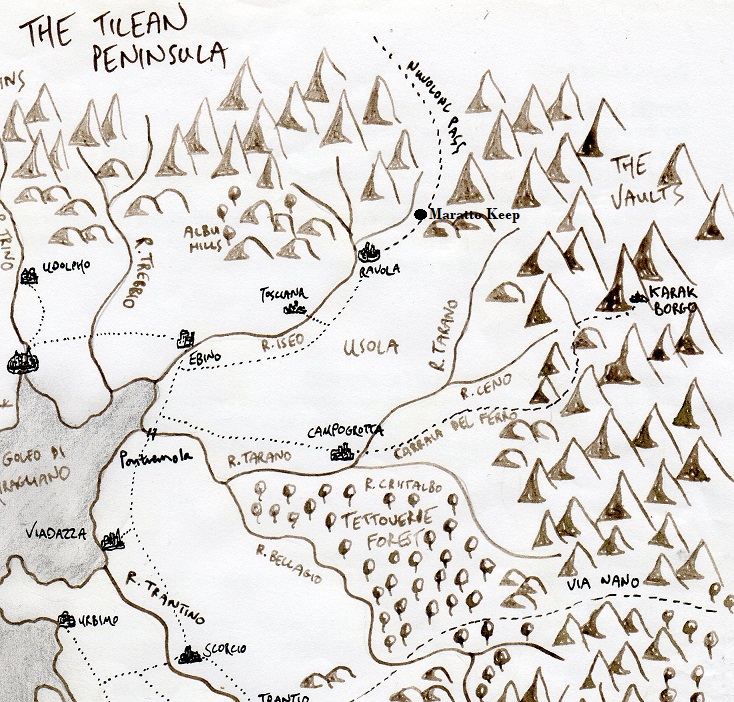
King Jaldeog III of the dwarven mountain realm of Karak Borgo was not the most imposing of dwarfs. His beard looked the part, the very essence of a royal chin ornament, being suitably grey and cultivated to a width almost twice that of his head. Not that his head was small, but a size perfectly satisfactory for dwarven royalty. In particular, his nose could very much hold its own, a proboscis to be proud of, which indeed he was. It was the rest of him that let things down, for he was almost as short as a full-grown dwarf can be (if such backwards reasoning makes any sense), making his nearest attendant, his chancellor Obor Darkforge, seem quite massive in comparison. Even seated upon his throne, which raised his majesty’s feet a good foot and a half above the ground, his head was no higher than Darkforge’s.
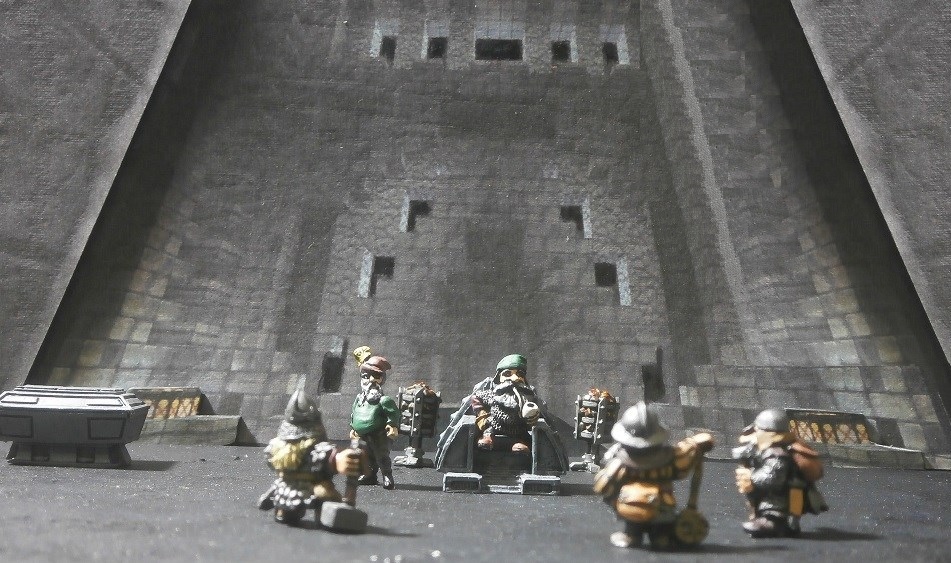
Perhaps this was why Jaldeog favoured somewhat humble attire, unlike most other dwarven monarchs? No golden crown for him, nor even a horned-helm edged with silver filigree. No armoured plates of engraved mithric, nor even a cloak trimmed with the shaggy fur of some legendary beast. Instead, upon his head he wore a simple cloth cap, and his armour was an entirely unadorned mail shirt. Did he believe he would look ridiculous in the garb of a hero? If a stranger were somehow to encounter him alone upon a mountain path, they would likely presume him to be a mere old soldier, and one of the lowliest kind. As he himself was fond of joking, he was not mutton dressed as lamb, but lamb dressed as mutton.
Two braziers smouldered behind him, the warmth of which gently penetrated his stone throne, warming his royal arse. He fiddled with his pipe and belt bag of tobacco, both being companions even more constant than Darkforge. Before him stood his two most important thanes, Asgrod Steelshaper and Narhak Thundersword, and the master of the watch, Vagroth Ashhelm. Chancellor Darkforge had summoned them to be questioned concerning matters military and political, especially the progress of the plan to re-open the iron road trade route by defeating the wizard Lord Niccolo of Campogrotta and his army of ogri.
After a sniff, a cough, and some more fiddling with the spent ash in the bowl of his clay pipe, the king eventually spoke.
“The Bretonnian. Let’s start with him, eh?”
Vagroth, Master of the Watch, answered. “My liege, word has come concerning the force he commands. As you yourself suspected, it is not impressive.”
“Nor is his claim to Campogrotta,” said Asgrod, Thane of Deephall.
“True,” said the king. “But if the king of Bretonnia has given his blessing, that lends respect to his name in the realms of men. I won’t go to all this effort only to have the humans entangled in a civil war afterwards. As long as he’s a legitimate contender, I’m happy to have him as an ally.”
“The Ravolan way has always been that might is right,” said Vagroth. “They fought tourneys to decide upon a new lord. Baron Garoy is not what anyone would call ‘mighty’.”
The king gave a sound, half snort, half laugh, dropping some of the tobacco he had been stuffing into his pipe. “He doesn’t have to be mighty. Not if there’s no-one else to fight the tourney. No-one of consequence, no-one of noble enough blood. Once Ravola is taken, he’ll rule long enough to make a start putting things back the way they were. That’s all we need.”
“My liege, he promised much more than what he is bringing,” said Vagroth. “He has merely a handful of mounted men-at-arms, the rest of his company being footmen, mainly archers and spearmen – mercenary villains they call Brabanzon. He has used what we gave him to hire inferior soldiers, and no doubt cheaply.”

“We do not need him to bring a big army. Remember we have hired our own mercenaries, and in considerable numbers.”
“As Garoy used our gold to hire the Brabanzon,” said Chancellor Darkforge, “then we have effectively paid for those too.”

“Lucky we can afford it then,” joked the king. “I say the more the merrier. Numbers never hurt in war.”
“Aye, my liege. Numbers can help, if used well,” agreed Vagroth. “But it is likely these are brigands who could not easily find employ in Bretonnia. Using them well will mean not relying on them!”
“I would never pin my hopes solely on men, good master Vargroth” said the King. “But they have their uses, especially when we have insufficient warriors of our own to achieve our goals. Still, we have acquired more than the services of these men and the baron.”
King Jaldeog fixed his eyes on Narhak of Dravaz, who was now standing by Asgrod of Deephall. Both thanes held hammers in their hands, the first a large mallet of oak, the second a warhammer of steel. The former was an ancient and magically blessed artefact gifted by the elves of Tettoverde Forest to Narhak’s father during an old alliance against the Skaven. It had no runes inscribed on it, nor a scrap of iron, steel or even brass about it, and yet it could break stone, and had once killed three goblins with one swing. The fact Narhak was proud to bear an elven-made weapon marked him out as unusual amongst dwarfs. He was stubborn enough to ignore the petty slights – apart from direct insults of course. This unusual link to the elves was the very reason he had been ordered to take command of affairs to the south.

“What news, Narhak, of the Compagnia del Sole?” asked the king. “Are they bringing what they promised?”
“They have crossed the sea,” answered the thane, “and landed all that was promised, perhaps even more. The crossing was not easy, for the ships’ captains are somewhat reluctant to venture into those waters, what with the war against the zangrunaz duchess, and more sightings of thagorakki vessels.”
“Whisht, Narhak,” ordered the king. “I’ve enough to think about with the ogri. One problem at a time, eh, starting with that closest to home? We can contend with the undead abominations and the scuttling filth later.” The king seemed to have forgotten his pipe, for he did not light it. “Will the mercenaries reach Campogrotta before Razger returns?” he asked.

“They are on the march, intending to go by way of Scorccio,” said Thane Narhak. “I know not how they intend to get past the zangrunaz’s forces. I suggested they use the same way Boulderguts used when travelling south. for he seemed to avoid entanglement with the undead.”
“Ah,” said Darkforge, “but that might be because of an alliance between the zangrunaz duchess and Boulderguts’ master, the wizard lord Niccolo. I have heard such is whispered in Tilea.”
“Well, the route will keep the company some distance from Ebino,” continued Narhak. “Granted, it will take them longer to skirt sufficiently wide, but I think it possible they can reach Campogrotta unmolested. My own rangers report it is very quiet along the Tarano and the Bellagio, and both rivers are low for the time of year. Tettoverde is quiet too. I suggested to the rangers that they might lead the army through the forest as there is an ancient path from where the Bellagio bends north up to Tarano Keep.”
“Well and good,” said the king. “But I ask again. Will they get to Campogrotta before Boulderguts?”
Narhak hesitated, so it was Thane Asgrod who answered,

“No-one can promise that, my liege. The news from the south is confused. The ogri appear to be almost everywhere, the zangrunaz everywhere else. But by your leave, my liege, might I suggest that perhaps the mercenaries do not need to beat Boulderguts in the race? From all the reports, it seems the ogri have rampaged far and wide, burning a wide swathe of destruction upon their … what was the word Baron Garoy used? … ‘chevauchee’, aye. Boulderguts has done this without reinforcements from Campogrotta. If any such had left the city our rangers would have seen them – the ogri are not exactly quiet, nor sneaky. Boulderguts has fought several battles, no doubt enriching himself considerably in the process, but each time he fought his force must surely have dwindled. It is reported his hireling, Mangler, is dead, and both ogri armies have been severely mauled, and not even a single ogri has come through the Appucinni passes to reinforce them. Between our own warriors, the Condottierri Mazallini’s soldiers and whatever Baron Garoy brings, we can surely defeat whatever force he limps back with. And if …”
“Ah,” interrupted the king, prompting Asgrod to fall silent, “yet is it certain we can defeat both him and the forces his master Lord Niccolo has at Campogrotta? Which is why I am asking whether the Compagnia can get to Campogrotta before Boulderguts.”
At first, no-one spoke, and the king took the opportunity to put his pipe to his mouth, having forgotten it was not yet lit.

“Can we not destroy them piecemeal, my liege?” asked Asgrod.
“Aye, likely so,” said the king somewhat nonchalantly. “That means we must ensure they do not join forces.” He held his hand to his mouth, as if pondering, but also perhaps signalling that the others should remain silent as he did so. “Best then that the mercenaries intercept Boulderguts’ army before he gets home. We should defeat him first, at some remove from Campogrotta, for if instead we besiege the city and that work becomes protracted, it could give bloody Boulderguts all the time he needs to return. Then we’d face them all, front and rear. I say defeat Boulderguts first and then we shall have all the time we need to take the city.”
There was nodding and a murmur of agreement from all those gathered. The king took the opportunity to rummage for more tobacco from his pouch and to further pack his pipe’s voluminous bowl. He may have been small for a dwarf, but he made up for it by doing nothing by halves. When he slept, he slept several hours longer than most. When he ate, he feasted upon sufficient to satisfy two. And when he smoked, he liked to send fumes curling into every nook and cranny of the hall.
At last, Darkforge noticed what the king was doing and stepped up to take the pipe to the brazier. Meanwhile, the king leaned forwards upon his throne to address his master of the watch, asking,
“Besides those he has at Campogrotta, what forces does Lord Nicolo have elsewhere?”
“Nothing much, my liege” said Vagroth, “and that only in Ravola.”

“Are you certain?”
“Those few Ravolans who escaped into the mountains looking for safety told us there are very few ogri at what remains of the city. My rangers report that the ogri ate almost everything, man and beast, and stole all else of worth.”
The king was nodding. “Which would be why there’s little in the way of forces there. Why bother to garrison in strength if there’s nothing left to guard?”
“It is not entirely abandoned,” said Vagroth. “I reckon they left a company or two simply to keep an eye on the Nuvolonc Pass.”
“Didn’t they destroy the fortress at Maratto?” asked the king.
“They did, my liege, so they now garrison Ravola instead. I have warned Baron Garoy, and ordered my rangers to bring him another way. This should be easy enough in summer. They could probably defeat what few ogri are there but then we would most likely lose the element of surprise.”
Again the hall fell quiet, as King Jaldeog drank in the first pull of smoke from his pipe.

Having released a pleasantly coiled cloud, he asked,
“If there is an alliance between the zangunaz duchess and Lord Niccolo, then might Boulderguts be reinforced upon his return journey? Or perhaps the wizard lord will call upon his allies to relieve him of our siege?
“My liege,” said Darkforge, “would even he invite the likes of her foul followers to his realm?”

Vagroth raised his hand and spoke. “Some say that Lord Niccolo is a zangunaz himself, which is why he keeps so hidden, and why he has lived so long. If true, he would not forbear inviting such into his realm. Indeed. he might well have his own undead servants.”
“As far as we know,” said Narhak, “the ogri and this zangunaz have not joined forces before. The reports of their alliance are but speculation, as well as the claims that he himself is undead.”
“Aye,” added Vagroth. “That’s true. His ogri even fought against the zangunaz Adolfo at Viadaza.”

“That may well have been trickery,” offered Asgrod. “To lull their real enemies into a false sense of security, while they planned their great raid. If they had not been slaughtered during the uprising at Viadaza, they could have turned against their so called allies, perhaps an act of assassination or treachery, at a crucial moment in battle?”
“We shall assume nothing,” said the king, authoritatively. “And we shall act quickly. Our warriors must be ready to march as soon as the Bretonnian arrives. We will pass by Campogrotta to meet the mercenaries, and if we cannot get to them before encountering Boulderguts, then we’ll pincer the enemy between us. We shall deal with the city once the ogri tryant is defeated.”
There were ‘Ayes’ all around.
…………………….
The End of Spring, IC2403
Part Six: They were going the other way!
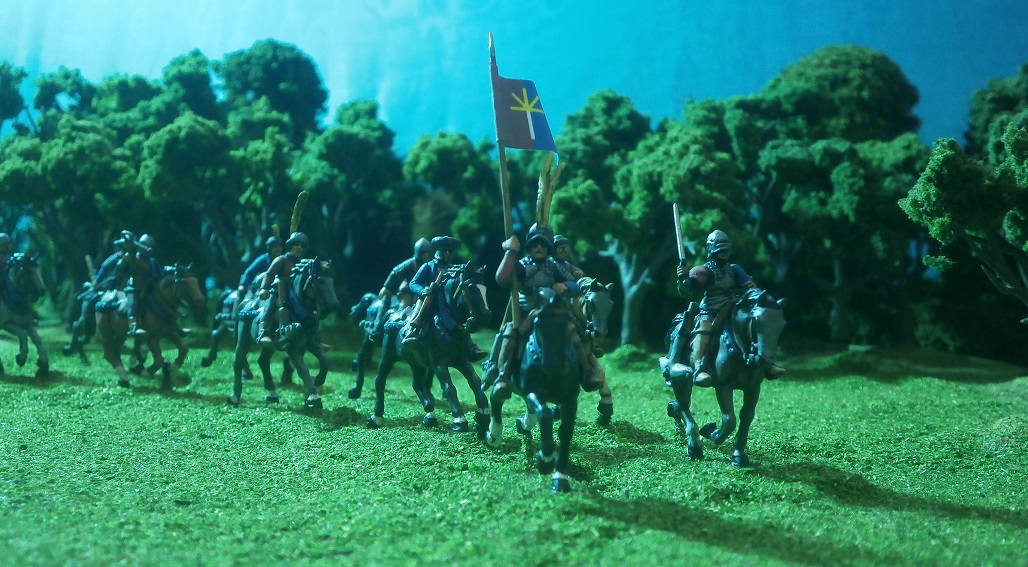
As ever, they were riding a little way ahead of the army, scouting out the intended route. Being the Compagnia’s fastest troops, well-mounted but lightly armoured, it was their job to act as outriders and scouts, and they had done so a hundred times in Estalia. There, the journeys had often been sunlit rides through pastoral landscapes, to learn the lie of the land, and keeping an eye out for the enemy. Here, however, back in their own homeland, it was different. The razed villages were familiar enough, for such destruction was to be found anywhere a war was being fought, and there was no shortage of ruins – barely a plank of sawn timber that was not charred or shivered, nor any door still fitted properly upon its hinges. It was how they felt that was different. Back in Estalia they were searching, unsurprisingly, for Estalians. Here, however, they were scouring the terrain for signs of brute ogres or the foul servants of vampires – the stuff of nightmares made real. Very different prospects compared to your average Estalian.
The company’s ensign, whose guidon bore the Compagnia del Sole’s Myrmidian emblem, was up at the front with the sergeant, while the rest of the company rode loosely in pairs behind. Apart from the ruins, the land was otherwise green and pleasant, what with it being late Spring, but eerily quiet, there having been no sound of birdsong, or ought else, for the last quarter of an hour. The quietness of the land seemed to pervade them. It was not a peaceful sort of feeling,but ominous, imbuing them with a growing sense of foreboding.
Dotted along the route were copses of trees and one or two good sized woods. The sergeant, made cautious by nature’s silence, insisted on riding close to each to see what might lurk there, which meant they were tacking their way through the valley like a flotilla attempting to sail close to the wind. Twice now they had turned almost back on themselves because the sergeant had noticed a clump of trees they had missed earlier. This was a level of caution the sergeant had never exhibited in Estalia, and although he tried to hide his nervousness, his actions very clearly advertised his true state of mind.
Amongst their number rode Ramondo Pisani upon his dun-coloured mare Pulce. For the last half an hour or so he had been deep in thought, allowing Pulce to much of the work following the rest of the company. It had occurred to him that was one good thing about their exertions – at least the journey back should prove a short one, as not only was the army itself moving up behind, but they could return by a straighter, and much shorter, course.
He wasn’t the only quiet one. Just about everyone else had been silent for some time, the only sounds being the dull thuddering of the horses’ hooves, the clattering of harness and trappings, and the occasional snapped command from the sergeant to wheel here or incline there. Ramondo’s thoughts had taken a darker turn. He had begun the day by waking from a dream about Gianetta. She had been laughing at him from her window in Urbimo, happy to see that he had returned as he promised, and that he now wore a cuirass of steel marking him out as a mounted man-at-arms. Soon after waking, there had been some tomfoolery during breakfast concerning what Lazzero had said in his sleep, which had everyone laughing, then after that there was the need to harness Pulce and prepare for the ride.
Almost as soon as they had left the sounds of the camp behind, the rest of the army being tardy in their preparations for the march, Ramondo’s mind had begun its own journey. First, he pondered what the rocky realm of Campogrotta might be like, and whether they would be required to march into the mountains to the dwarven realm, but this soon turned into a contemplation of the enemies they might face along the way. Would the ogres be like the ones he had encountered before: huge, strong, clumsy, loud and sweaty; keen mercenaries with a cruel streak and a ravenous taste for flesh, even that of men? Or would they be more wild and crazy in battle like the stories of the savage brutes from the eastern lands? Then he wondered whether he would have to face the undead before even reaching the ogres. It seemed Compagnia was attempting to stand well out from Viadaza and Ebino, taking the more direct route to Campogrotta, one without roads or even, for some of the way, paths. But as no-one knew exactly where the vampires’ forces were in the first place, the precaution was merely a best guess strategy.
In the hope of distraction, for a while he had joined in his comrades’ conversation, limited as it was to occasional, shouted jokes and jibes. They talked of events in Urbimo: of the women, the drinking, the gaming. But then someone said something about an old Urbiman grandmother begging them to stay, to keep her family from falling into hell, and their enthusiasm for the topic paled, then died. So they talked instead of the sea journey from Estalia, of the sea-sick pig sliding around the deck in its own vomit, and the flying fish that knocked the flux-ridden Donnino squatting at the head into the sea, his breeches left dangling behind. But then someone mentioned the shadowy ships seen at night and the eerily threatening shouts, part chirruping, part squealing, that came from the darkness, and once again the conversation faltered. When someone later mentioned the vampire duchess, they were met by an immediate silence, which became prolonged, so toppling Ramondo back into his own gloomy thoughts.

That was when he noticed the smoke in the large wood to their left. Someone up at the front shouted,
“Have a care! Fire!”
Everyone looked, their trotting pace slowing a little, but then someone else declared,
“No, that’s fog.”
Ramondo knew immediately that something was not right. It was surely too late in the morning for fog to appear. They had seen no sign of it until now. Besides, why was there no fog in any of the other copses they could see?
As they rode on, nearly every face turned to the fog.
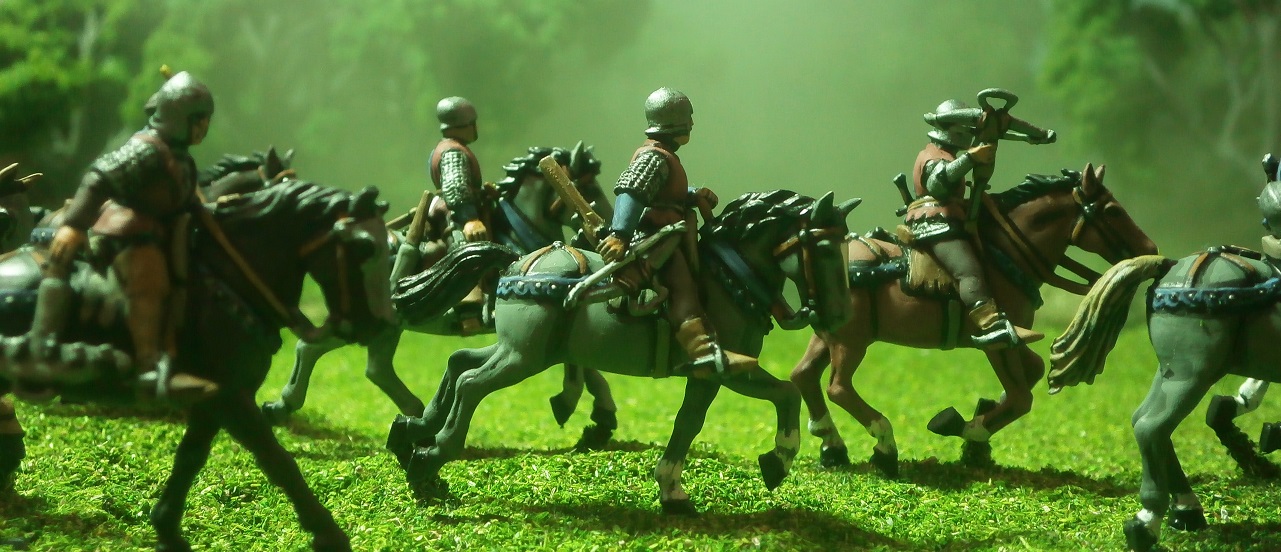
“That ain’t natural,” said Arrigo, riding just ahead of Ramondo. “That’s wizardry, or elves.”
“I pray you’re right,” said Franceso, from behind. “For if it ain’t, then its necromancy!”
“Necromancers don’t summon fogs, they summon the dead,” argued Arrigo.
Ramondo rolled his eyes, wishing Arrigo wouldn’t talk about summoning the dead. It could not be good luck to mention such things.
“I don’t know,” said Francesco. “They mess with the etheric winds, which makes all sorts of funny stuff happen, not just whatever wickedness they intend. Remember that time Albiete tried to conjure fire against the crossbowmen on the walls of Vizeaya and burned half the …”
“Keep your eyes peeled!” barked the sergeant. “Ramondo, Francesco – rear-guard!”
Ramondo pulled on Pulce’s reins to slow her, as did Francesco, and they fell back to the rear of the little column.
“It’s always us!” complained Francesco. “You and your nimble eyes, and me to look after you.”

Ramondo managed a wink, as if untroubled by the situation, and then set about scouring the tree line.
The fog thinned then thickened, then thinned again, giving Ramondo hope that it might not be so sinister at all. Maybe it had rolled down the slopes of the hill to the north, a heavy cloud grown too tired to remain aloft? The thinning never lasted, however, and each time it thickened up they slowed a little, falling incrementally further behind the others. He narrowed his eyes to peer into the misty gloom among the trees.

If he had allowed his imagination to run wild he could have seen anything he liked in there, for the tree-branches stretched, bent and criss-crossed to fashion up all sorts of possibilities: there a huge face with ragged holes for eyes, and there a man kneeling in prayer before a rock. But each image was momentary, as Pulce trotted on and the branches’ tricks slipped away.
Then he saw a grinning face, looking right back at him. White like the fog; a misshapen, imperfect representation of a human face, with arms raised strangely.

Grown used to the playfulness of the foliage and fog he looked with simple curiosity at first, but this changed quickly into fear, for there were were more such faces, and they did not melt away with his motion, having instead a motion of their own. They were not made imperfect by the lie of the branches and swirl of the vapours, but because of a lack of flesh! Worse still, there were bodies below the faces, weapons in their hands and bony horses to carry them.

Ramondo felt his body weaken in fright, his insides seeming to shrink, his grip upon the reins threatening to loosen. Pulce could not have noticed, for she ran on like before, until she sensed the change in Ramondo, and her stride faltered a little. He could not speak, only able to stare as he rode one way and they the other. The heads turned to keep their eyeless sockets fixed upon him, and as they moved into a thinner patch of fog he realised there were more than two of them. Their mounts wore barding of an ethereal hue, and flecks of lurid green fire speckled both their weapons and bony bodies.

Coming to his senses – at least those he could muster – he spurred Pulce on, and began to gallop towards the rest of the company. The fleshless riders simply continued their course, as if they had a purpose they must fulfill, and became enveloped once again by the swirling mists.
“What is it?” shouted Francesco, as he joined the gallop. “What’s wrong?”
In answer, Ramondo galloped faster, shouting “With me!”
He had to tell the others, and quick. The vampire duchess’s servants were much, much closer than anyone had thought!
———————————-
Next Installment: Part 18